- Share full article
Advertisement

Famous for Happiness, and Limits on Tourism, Bhutan Will Triple Fees to Visit
As Venice and other European hot spots explore permit systems and daily fees to limit the number of tourists, the tiny Buddhist kingdom will require a $200 tax on international visitors when it reopens this fall.

By Ceylan Yeginsu
- July 5, 2022
The tiny Buddhist kingdom of Bhutan on the eastern edge of the Himalayas, often referred to as “the last Shangri-La” for its abundance of natural beauty, sustainable development and rich cultural heritage, has long resisted the quick financial returns of mass tourism in favor of conservation. The approach is aligned with a cultural philosophy where the country’s wealth and prosperity is measured, through a national happiness index , as an alternative to the gross domestic product.
Since 1974, the year when foreigners were first permitted to visit Bhutan, the country has had a unique “high value, low volume” tourism policy , requiring international visitors to pay at least a daily rate of $250 that covered accommodations, meals, a mandatory tour guide and included a $65 “sustainable development fee” to the government. The package-like approach was aimed to preserve the natural resources of the country by limiting the number of international visitors and controlling where they went. While some tourists complained of poor hotel plumbing, slow internet access and bland food, many appreciated the ease of the predetermined tours.
Now as the government of Bhutan prepares to reopen its borders on Sept. 23, it has overhauled the tourism system and will significantly raise the cost to visit. Visitors no longer need to be on a package tour, but they will now have to pay a $200 daily fee directly to the government, and pay separately for their accommodation, meals, tours and other travel expenses. The new policy, officials say, will rebrand Bhutan as “an exclusive destination,” attracting “discerning tourists” who will have access to a wider range of higher-quality services.
“Covid-19 has allowed us to reset, to rethink how the sector can be best structured and operated, so that it not only benefits Bhutan economically, but socially as well, while keeping carbon footprints low,” said Dr. Tandi Dorji, Bhutan’s foreign minister and chairman of the Tourism Council of Bhutan. “In the long run, our goal is to create high-value experiences for visitors, and well-paying and professional jobs for our citizens. ”
But many tour operators express anxiety over the change. They are worried that the new structure will leave them without any business — uncertain whether they will be able to attract a sufficient number of tourists with the higher fee, or if tourists will even require their services at all, now that they will have the option to book directly through hotels, tour guides and the like.
“Just when we thought we were seeing the light at the end of the tunnel after two-and-a-half years of being out of business, the government’s tourism amendment bill has thrown us back in the darkness and we have no idea how to go about it,” said Pelden Dorji, the chief executive officer of the Bhutan Travel Club, a company that specializes in adventure travel experiences.
Mr. Dorji has already received cancellations from groups that had booked, but not paid for, packaged trips they had scheduled later in the year. He said the group members felt that they could not justify paying an additional $200 a day on top of the other expenses that had been agreed upon as part of the previous package deal.
‘Deep love and respect for nature’
Under the previous policy, all bookings and payments had to be made through registered local tour operators, who were required to organize a prearranged itinerary with fixed dates and overnight stops.
“It’s basically a package tour that lets you see an authentic, untouched corner of paradise while protecting itself from being invaded by tourists,” said Megan Petersen, 44, a London-based makeup artist who visited Bhutan in 2017. “It’s genius and places with overtourism problems should use the same model.”
Ms. Petersen spent eight days exploring Bhutan with her sister, trekking through forests and mountain meadows, hiking to cliff-side temples and meeting local communities in remote villages. Throughout their trip, they camped and stayed in basic three-star accommodations. Everything was included in their package.
“The lodges and food were pretty average, but that just added to the experience of being able to experience the real community and culture without the fake tourist treatment,” Ms. Petersen said. “What makes Bhutan so special is the kindness and spirituality of its people and their deep love and respect for nature and their land.”
Government officials say the previous policy discouraged additional out-of-pocket spending, as many travel agents would assemble their trip activities, food and other offerings to not exceed the $250 daily rate — the practice effectively turned the policy’s minimum rate into the maximum.
“The policy caused more misunderstandings than understanding and it has resulted in lowering the services that we are potentially able to offer,” said Prime Minister Lotay Tshering.
Under the revised tourism bill, which was passed by the Bhutanese parliament last month, Bhutan will be able to reinvest “in bringing up the quality of tourism products, especially in terms of training our guides, bettering the quality of our hotels, restaurants and food, while preserving the pristine environment that we have for generations to come,” the prime minister said.
One of the government’s main priorities, Dr. Tshering said, is to invest in waste management infrastructure and protect Bhutan’s biological corridors, nature parks and main cultural assets. Bhutan’s constitution mandates that 60 percent of the country’s land must be under forest cover and maintains strict laws to protect and uphold its carbon-negative status.
“This all costs money,” Dr. Tshering said.
‘Why fix something that is not broken?’
While Bhutanese travel representatives had expected some reforms to the country’s tourism policy, the threefold increase to the government’s sustainability tax came as a shock, with many fearing that the new model will turn tourists toward cheaper destinations at a time when the country is desperate for tourism dollars to boost its post-pandemic recovery.
Tourism revenue is a key contributor to Bhutan’s economy, making up 6 percent of the country’s gross domestic product. Some 29,000 tourists visited Bhutan in 2020 before the borders were shuttered in March of that year, and generated a revenue of $19 million. In 2019, 315,599 tourists visited, earning the tourism industry $225 million, according to the Tourism Council of Bhutan. The kingdom eased its travel restrictions earlier this year, allowing in foreign visitors on a case-by-case basis and requiring them to quarantine.
Tourism operators argue that the minimum package framework incentivized tourists by including all essential services.
“Everyone is asking, ‘why fix something that is not broken?’” said Lotay Rinchen, co-founder of the tourism company Bridge To Bhutan, Bespoke Mindful Journeys . It “protected the travel industry and ensured a certain level of quality and business,” he said of the prior system.
Mr. Rinchen was always in favor of increasing the price of the minimum fee. But without the requirement of the package structure, he says he anticipates the Bhutan brand will be harder to sell. He has started to explore the possibility of offering luxurious products to lure in tourists willing to pay the higher costs, like chic boutique lodges, wellness retreats and upscale glamping. Previously tourists could pay extra for high-end hotels like the Taj Tashi and Le Meridien Thimphu , but many chose the basic options included in the minimum daily fee package.
“This is not the right timing. Bhutan’s economy is in bad shape, and we had expected to open up tourism and start earning hard currency again, but this price hike will keep tourists away,” said Mr. Dorji of the Bhutan Travel Club, adding that the new model could attract a demographic of older sightseeing tourists who would “skim from one luxury hotel to another, without experiencing the Bhutanese way of life.”
The prime minister said that was not the government’s intention. “We want to make sure that we get a set of tourists who are intellectually high-standing, knowledgeable and conscious of our needs and unique features,” he said.
Elsa Foster, 44, an American personal trainer who lives in Scotland, took a mountain biking tour in Bhutan with a group of friends in 2018. After a day of sightseeing in Bhutan’s capital, Thimphu, they embarked on a seven-day off-roading adventure, cycling through remote mountain valleys and villages. Ms. Foster said it was very practical to have hotels booked by their tour agent as they stayed in a different location each night.
“I really liked how everything was organized and packaged with the old fee system, all you had to do was show up,” she said. “But to pay 200 bucks on top of all the other expenses, you’ve got to be pretty rich and it’s a shame that Bhutan will become inaccessible to young people who won’t be able to afford it.”
The government hopes the new policy will have the opposite effect, attracting a wider demographic. “All we mean is to welcome with a very open heart all individuals and potential visitors who want to visit and experience the uniqueness we have to offer,” Dr. Tshering said. “Then we will ensure that the visitor will get the value of the money that is spent in Bhutan.”
The United States was one of the top tourism markets for the kingdom before the pandemic, behind India and Bangladesh, with 13,016 Americans visiting in 2019 and spending an average of 10 nights, according to the Tourism Council of Bhutan.
Karma Tshering, an environmental conservation and ecotourism specialist, said the government should use the increased tourism tax to meet its sustainability goals, which could include investing in hiking trails, highway amenities and training and support to service providers.
He is worried that without the minimum-spend policy, “which helps our service providers obtain minimum revenue to support their services, our people will be left in the hands of the tourists to negotiate and bring down prices,” Mr. Tshering said, adding that there could be “a chain impact on delivering quality services and high-end experiences.”
Some sectors see an opportunity in the change. Sonam Wangchuk, chairman of the Hotel & Restaurant Association of Bhutan, said the amendment was long overdue and will bring positive change where all hotels and restaurants will have equal opportunity.
“I guess it is now the survival of the fittest, where one now needs to pull up their socks and become a go-getter,” he said. “The old days of business knocking at your door are gone, therefore the harder we work the more promising it will be.”
Chencho Dema contributed reporting from Kansas City, Mo.

52 Places for a Changed World
The 2022 list highlights places around the globe where travelers can be part of the solution.
Follow New York Times Travel on Instagram , Twitter and Facebook . And sign up for our weekly Travel Dispatch newsletter to receive expert tips on traveling smarter and inspiration for your next vacation.
Ceylan Yeginsu is a travel reporter. She was previously a correspondent for the International desk in Britain and Turkey, covering politics; social justice; the migrant crisis; the Kurdish conflict, and the rise of Islamic State extremism in Syria and the region. More about Ceylan Yeginsu
Open Up Your World
Considering a trip, or just some armchair traveling here are some ideas..
52 Places: Why do we travel? For food, culture, adventure, natural beauty? Our 2024 list has all those elements, and more .
The Alaska Highway: On an epic road trip, a family plots a course from Alaska to the Lower 48, passing through some of Canada’s most spectacular scenery .
Minorca: Spend 36 hours on this slow-paced Spanish island , which offers a quieter and wilder retreat than its more touristy neighbors.
Japan: A new high-speed train stop unlocks Kaga, a destination for hot springs, nourishing food and traditional crafts , as an easy-to-reach getaway from Tokyo.
London: The Victoria and Albert Museum is a treasure trove of art and design. Here’s one besotted visitor’s plan for taking it all in .
How Bhutan aims to balance economy and environment through tourism

Bhutan is already 72% carbon negative, meaning it absorbs more carbon dioxide from the atmosphere than it produces. Image: Pexels/Soonam Wooeser
.chakra .wef-1c7l3mo{-webkit-transition:all 0.15s ease-out;transition:all 0.15s ease-out;cursor:pointer;-webkit-text-decoration:none;text-decoration:none;outline:none;color:inherit;}.chakra .wef-1c7l3mo:hover,.chakra .wef-1c7l3mo[data-hover]{-webkit-text-decoration:underline;text-decoration:underline;}.chakra .wef-1c7l3mo:focus,.chakra .wef-1c7l3mo[data-focus]{box-shadow:0 0 0 3px rgba(168,203,251,0.5);} Roli Srivastava

.chakra .wef-9dduvl{margin-top:16px;margin-bottom:16px;line-height:1.388;font-size:1.25rem;}@media screen and (min-width:56.5rem){.chakra .wef-9dduvl{font-size:1.125rem;}} Explore and monitor how .chakra .wef-15eoq1r{margin-top:16px;margin-bottom:16px;line-height:1.388;font-size:1.25rem;color:#F7DB5E;}@media screen and (min-width:56.5rem){.chakra .wef-15eoq1r{font-size:1.125rem;}} Travel and Tourism is affecting economies, industries and global issues

.chakra .wef-1nk5u5d{margin-top:16px;margin-bottom:16px;line-height:1.388;color:#2846F8;font-size:1.25rem;}@media screen and (min-width:56.5rem){.chakra .wef-1nk5u5d{font-size:1.125rem;}} Get involved with our crowdsourced digital platform to deliver impact at scale
Stay up to date:, travel and tourism.
- Bhutan, a tiny Himalayan kingdom known for its pristine environment and sustainable development, will cap tourist numbers at 200,000 a year from 2023 to protect its natural resources and fight climate change.
- The move is part of the country's efforts to become carbon neutral by 2025.
- Bhutan is already 72% carbon negative, meaning it absorbs more carbon dioxide from the atmosphere than it produces.
- The government said the cap would be enforced through a quota system, with each tourist paying a daily fee of $250. The money will be used to fund conservation and development projects.
In the scenic Himalayan kingdom of Bhutan, cleaning squads patrol forests and mountain trails on the lookout for litter left behind by tourists, removing empty water bottles and crisp packets stuck in bushes and trees.
The money to run these teams comes from a tourist tax Bhutan has levied for decades to avoid over-tourism and preserve its status as South Asia’s only carbon-negative country - meaning it absorbs more emissions than it produces annually.
Bhutan halved the daily “Sustainable Development Fee” (SDF) - to $100 - last week as it strives to strike a balance between supporting the local economy and jobs, and protecting nature and the environment in the face of worsening climate change impacts.
Under the country’s principle of “high-value, low-volume” tourism, Bhutanese officials told the Thomson Reuters Foundation that the tax goes towards upgrading infrastructure, preserving natural and cultural treasures, and investing in electric transport to cut fossil fuel dependency.
While the tiny country of fewer than 800,000 people is currently in the spotlight, it is far from alone in this regard.
A 2018 report by the Intergovernmental Panel on Climate Change found we have until 2030 – just 11 more years – to avert climate change.
The run-up to 2020 is a crucial period for delivering sufficient climate action to limit global warming to 1.5°C, as countries move to expand their climate commitments.
To help meet this global challenge, the World Economic Forum's 2019 Sustainable Development Impact summit has made Accelerating Climate Action one of four focus areas.
Following the UN Secretary-General’s Climate Action Summit this month, this meeting will bring together stakeholders to cap global warming at 1.5°C through innovative partnerships and smart technologies. The action areas include heavy industries and transport, energy innovation, nature-based climate solutions, restoring ocean health and the role cities, among others.
As nations globally seek to revitalise their tourism sectors after the COVID-19 pandemic, there is growing debate about how best to attract more visitors and boost revenues without causing overcrowding and fuelling pollution and harm to the environment.
Sustainability experts said the traditional approach of evaluating tourism through visitor numbers alone was outdated and damaging to the sector, and urged governments to consider ways of welcoming people for longer and more-considered stays.
“(A) sustainability fee is one of the ways to ensure a destination does not degrade,” said C.B. Ramkumar, vice chairman of the Global Sustainable Tourism Council, a U.S.-based non-profit. “It is a good tool for conservation.”
While many countries and cities have some form of tourist tax, few places have followed Bhutan’s lead in ensuring that the cash goes towards conservation or sustainability efforts.
New Zealand in 2019 introduced a NZ$35 ($21) tourist tax to fund conservation and infrastructure projects, while Indonesia’s holiday island of Bali is to impose a 150,000 rupiah ($10) fee from 2024 to help preserve its culture and environment.
Using the tourist tax to boost conservation efforts
Tourism is responsible for around 8-11% of global greenhouse gas emissions - mostly due to transportation - according to the World Travel and Tourism Council (WTTC), an international forum.
It is also among the most vulnerable sectors to the impacts of climate change, with researchers citing soaring temperatures and rising sea levels that can affect visitor numbers.
For example, about 20,000 foreign tourists were evacuated from the Greek island of Rhodes in July, where a wildfire burned resorts and hotels. Greece has said it will offer a week’s free stay on Rhodes in 2024 to visitors whose vacation was cut short.
Overall, demand for eco-friendly tourism is growing, yet very few people are willing to pay more for sustainable travel, according to recent studies and warnings from sector executives.
In Bhutan, the SDF has been revised over the years - with discounts available for visitors making longer trips.
When Bhutan reopened to tourists in September 2022 after more than two years of COVID-19 closure, it raised the tax to $200 from the $65 it had charged for about three decades - saying the money would offset the carbon generated by visitors.
This fee hike, coupled with the pandemic’s impact, hit tourist numbers and resulted in losses for tour operators, hotel owners, and handicraft and souvenir shops in the country.
Bhutan welcomed nearly 60,000 tourists between January and August this year, earning the nation $13.5 million in revenue from the SDF, according to government data.
In 2019, before the pandemic, there were about 316,000 tourists, generating $88.6 million in SDF revenue.
When Bhutan announced the SDF reduction this month, the government said the move aimed to revive the tourism sector, generate employment, and earn the country foreign exchange.
Bhutan plans to lift tourism’s contribution to its $3-billion economy to 20% from about 5% now - yet no time-frame has been set.
Dorji Dhradhul, the director general of Bhutan’s tourism department, said the tourist tax is vital to stepping up the nation’s conservation efforts as it faces climate change threats of melting glaciers and ever-more unpredictable weather.
The SDF has led the country to explore “solutions to balance its revered ecological conservation practices with socio-economic progress”, Dhradhul said by email.
The tax funds free healthcare and education for the country’s citizens and is used to offset the carbon footprint of visitors by planting trees, cleaning and maintaining trails, and electrifying Bhutan’s transportation sector, Dhradhul said.
“Our future requires us to protect our heritage and forge fresh pathways for forthcoming generations,” he said.
Bhutan’s “carbon negative” approach began in the 1970s, when its then-king pushed for an economy built in part on sustainable forest management - balancing conservation and development.
Its forests absorb more than 9 million tonnes of carbon each year, while its economy, which is designed to cut fossil fuel use and waste, emits less than 4 million tonnes, Dhradhul said.
Have you read?
3 ways hotels and tourists can work together to decarbonize travel, how global tourism can be more sustainable, how bhutan could provide the blueprint for climate-smart forest economies, what can bhutan teach the world about climate action, tour operators and local businesses fear for future.
Bhutan has long been a prime holiday destination for Indian travellers in particular. Entry for Indians had been free until 2022, when a daily tax of 1,200 rupees ($14.50) was introduced.
Mumbai-based tour operator Rakesh Kalyani has a longstanding collaboration with hoteliers in Bhutan, and said he was not surprised by the move to impose a tax on Indian tourists.
“Tourists littered, someone even climbed a stupa (Buddhist shrine) and took pictures. How do you stop that?” asked Kalyani, who said he now has no bookings for Bhutan with many clients instead preferring to visit nearby northeastern Indian states.
The fee for Indian tourists will remain in place for at least another two years as Bhutan prioritises the wellbeing of its environment, culture and people over “quantity in tourism”, according to Dhradhul.
As more and more places worldwide consider tourist taxes, they run the risk of excluding those seeking affordable travel.
“They want to preserve their culture, but not everyone is able to travel now,” said Arjun Verma, who runs Bhutan Divine Tour agency in Siliguri, a district in India’s eastern state of West Bengal, which serves as the country’s gateway to Bhutan.
“As tour operators, we are facing a lot of problems.”
In Bhutan, Jigme Tshering, chairman of the Hotel and Restaurant Association, a national federation, said that while the SDF was aligned with the country’s vision of sustainability, it also posed challenges in terms of “the impact on businesses”.
He said he hoped the reduced tax will help the tourism industry grow at a faster pace than in previous months - a view echoed by local businesses seeking more customers and income.
In Bhutan’s Paro, the picturesque valley home to the Tiger’s Nest Monastery, handicraft shop owner Tashi Lhamo said she had cut down spending on family holidays and new clothes due to the loss in business over the past year as tourist numbers dropped.
“Most of our customers are Asians and few are from the United States,” Lhamo said in a phone interview.
“But I am hopeful for more international tourists to come now that they have reduced the SDF. Indians buy small items, but our main business comes from international tourists,” she added.
Don't miss any update on this topic
Create a free account and access your personalized content collection with our latest publications and analyses.
License and Republishing
World Economic Forum articles may be republished in accordance with the Creative Commons Attribution-NonCommercial-NoDerivatives 4.0 International Public License, and in accordance with our Terms of Use.
The views expressed in this article are those of the author alone and not the World Economic Forum.
Related topics:
The agenda .chakra .wef-n7bacu{margin-top:16px;margin-bottom:16px;line-height:1.388;font-weight:400;} weekly.
A weekly update of the most important issues driving the global agenda
.chakra .wef-1dtnjt5{display:-webkit-box;display:-webkit-flex;display:-ms-flexbox;display:flex;-webkit-align-items:center;-webkit-box-align:center;-ms-flex-align:center;align-items:center;-webkit-flex-wrap:wrap;-ms-flex-wrap:wrap;flex-wrap:wrap;} More on Industries in Depth .chakra .wef-17xejub{-webkit-flex:1;-ms-flex:1;flex:1;justify-self:stretch;-webkit-align-self:stretch;-ms-flex-item-align:stretch;align-self:stretch;} .chakra .wef-nr1rr4{display:-webkit-inline-box;display:-webkit-inline-flex;display:-ms-inline-flexbox;display:inline-flex;white-space:normal;vertical-align:middle;text-transform:uppercase;font-size:0.75rem;border-radius:0.25rem;font-weight:700;-webkit-align-items:center;-webkit-box-align:center;-ms-flex-align:center;align-items:center;line-height:1.2;-webkit-letter-spacing:1.25px;-moz-letter-spacing:1.25px;-ms-letter-spacing:1.25px;letter-spacing:1.25px;background:none;padding:0px;color:#B3B3B3;-webkit-box-decoration-break:clone;box-decoration-break:clone;-webkit-box-decoration-break:clone;}@media screen and (min-width:37.5rem){.chakra .wef-nr1rr4{font-size:0.875rem;}}@media screen and (min-width:56.5rem){.chakra .wef-nr1rr4{font-size:1rem;}} See all

Top 5 countries leading the sustainable tourism sector

Robot rock stars, pocket forests, and the battle for chips - Forum podcasts you should hear this month
Robin Pomeroy and Linda Lacina
April 29, 2024

Agritech: Shaping Agriculture in Emerging Economies, Today and Tomorrow

Confused about AI? Here are the podcasts you need on artificial intelligence
Robin Pomeroy
April 25, 2024

Which technologies will enable a cleaner steel industry?
Daniel Boero Vargas and Mandy Chan

Industry government collaboration on agritech can empower global agriculture
Abhay Pareek and Drishti Kumar
April 23, 2024
Bhutan revises its tourism policy to redefine High Value Low Volume tourism
Visitors to Bhutan will now have to pay more than triple the previous Sustainable Development Fees (SDF).
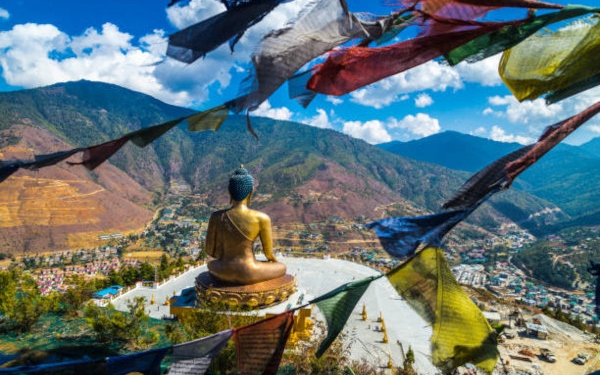
The sustainable development fee (SDF) for visitors to Bhutan has been raised from 65 USD to 200 USD per night . Similarly, the minimum daily package rate (MDPR) has been removed.
Previously, visitors to Bhutan paid 200-290 USD per night, where 65 USD went to the government and the remainder was used for lodging, transportation, and guides.
The implementation of the new rates will surely reduce the number of international tourists to Bhutan (regional tourists from India pay a different rate).
The new policy has stirred up some curiosity and displeasure outside of Bhutan. To get a better understanding of the motivations behind the move, Daily Bhutan reached out to the Director General of Tourism Council Bhutan (TCB), Dorji Dhradhul for a chat.
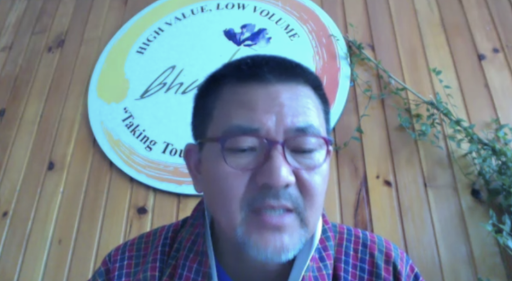
The conversation was enlightening. Mr Dorji shared with us that Bhutan is going through a transformation. It’s long overdue, and COVID-19 has given them the opportunity to reset. 11 aspects of the country’s activities are being reviewed, and tourism is just one of them.
When it comes to tourism, Bhutan realised that they have opened their doors too wide, so they decided to close it a little.
“The policy has been the same since the 70s — high value, low volume. We don’t want tourists beyond our capacity, and the numbers were manageable over the years."
“But there was a big jump within the past decade. In 2019, we had 315k tourists, nearly double of what we had in 2011. This has asserted pressure on Bhutan as we have a limited number of hotels, roads, and infrastructure."
“It got to a point where overseas tour agencies voiced that they will not be bringing more tourists, as Bhutan is no longer the high-end destination it once was,” Mr Dorji expressed.
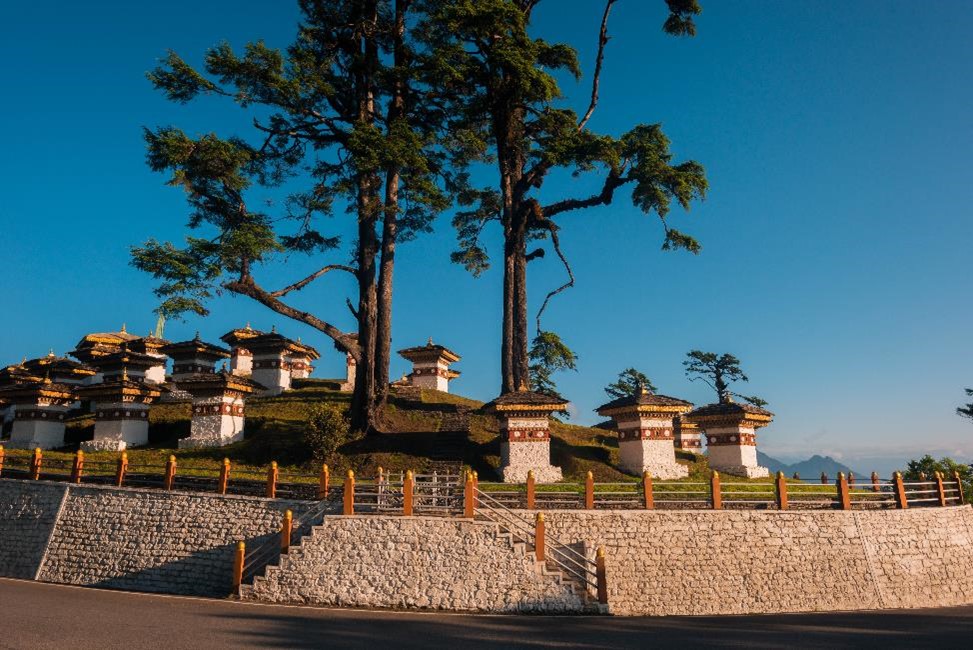
Within that decade, there was an explosion of cheap hotels and homestays. Loans were easy to obtain and laws were lax. The industry became a low-hanging fruit. Anybody with no opportunity in other sectors could just get a tourist licence and become an operator. There are currently 3,500 registered tour operators and counting, and more than 4,000 registered guides. There is an oversupply of guides and operators.
Corruption reared its ugly head too, with agents undercutting prices, operators trying to circumvent regulations, and various parties evading taxes.
Mass tourism has sidelined the Bhutanese communities, damaged the environment, and hijacked the local culture. Monasteries became crowded, disrupting the activities of the spiritual seekers. Worse still, loud music and unruly behaviour became commonplace at religious sites.
Now, where grocery stores used to sit are souvenir shops and cafes. The path to Chimi Lhakhang spots stalls with more gimmicks than handicrafts. Vehicles and tourists flood Dochula, a nuisance to the pilgrims trying to perform their prayers. Taktsang (Tiger’s Nest) was meant to facilitate a spiritual journey but is now full of rushing ponies, loud music, and cheap artefacts.
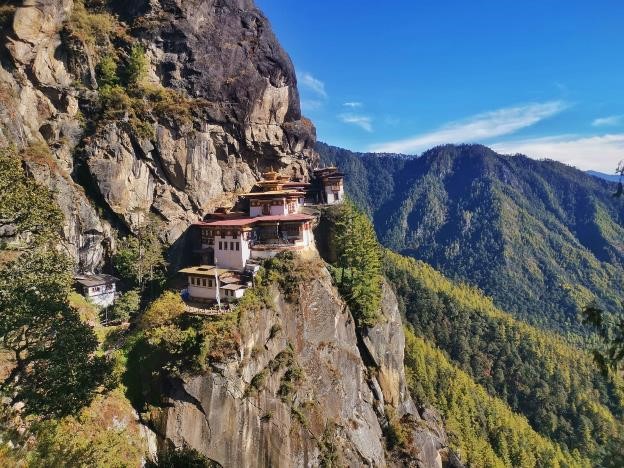
Bhutanese are welcoming in nature and are comfortable with visitors. But with mass tourism, they started to feel overwhelmed. For instance, the crowding of temples. Bhutanese are religious people with many rituals to perform, many of which are to be done on a particular day. Very often, when they arrive at the site, they discover a crowd of tourists.
With mass tourism, both the visitors and hosts become the losers
“We want our tourists to have an exclusive experience. As of 2019, we have not been able to do this. It’s high time we returned to our original intentions,” continued Mr Dorji.
For too long, Bhutan’s tourism sector has privatised profits but socialised losses. A small majority has benefited from the tourism sector while the farmers, who comprise over 50% of the Bhutanese population, receive close to no advantages.
Meanwhile, Bhutan has a growing carbon footprint from tourism, despite being the only carbon-negative country in the world. This is a worrying trend.
“The priority is for Bhutan to preserve its culture and way of life. If we have to sacrifice tourism, so be it."
“Tourism is like minerals, to be protected for the future generation. The present generation might have to make sacrifices and lose some of our business in the short term, but in the long run, we all benefit,” Mr Dorji said with certainty.
The current goal is simple: to return to the ‘high value, low volume’ principle the country started with. The country knows what needs to happen.
First, they must identify the roles of key tourism stakeholders, streamline the government taxes, and establish pricing that prevents mass tourism.
Right now, what Bhutan has to do is manage the quality of the travel experience so that both visitors and hosts can reap maximum benefits, a feat the Bhutanese government hopes to achieve with the revised SDF.
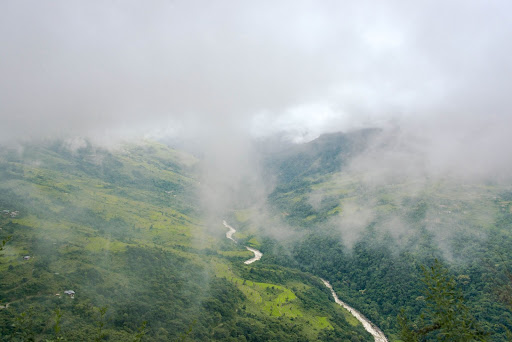
Revised entrance fees for sacred sites in Bhutan
In addition to the increased SDF, tourists are now required to pay an entrance fee when visiting various national monuments or sacred sites.
Visitors entering various national monuments and sacred sites are subjected to an entrance fees. Effective July 12, 2022, below are the sacred sites and entrance fees that visitors required to pay :
Taktsang Monastery : Nu. 2000 (~USD 25) Tashichho Dzong : Nu. 1000 (~USD12.50) Thimphu Memorial chorten : Nu. 1000 (~USD12.50) Changangkha Lhakhang : Nu. 1000 (~USD12.50) Kyichu Lhakhang : Nu. 1000 (~USD12.50) Rinpung Dzong : Nu. 1000 (~USD12.50) Punakha Dzong : Nu. 1000 (~USD12.50) Chimi Lhakhang (Fertility Temple) : Nu. 1000 (~USD12.50)
From September 23, 2022, visitors are required to pay entrance fees for 8 other monuments and sacred sites.
Jambay Lhakhang, Bumthang : Nu. 1000 (~USD12.50) Jantsa Dumtseg Lhakhang, Paro: Nu. 1000 (~USD12.50) Dobji Dzong, Paro : Nu. 1000 (~USD12.50) Rinchending Goenpa, Phuentsholing: Nu. 1000 (~USD12.50) Buddha Dordenma, Thimphu : Nu. 1000 (~USD12.50) Simtokha Dzong, Thimphu : Nu. 1000 (~USD12.50) Trongsa Dzong : Nu. 1000 (~USD12.50) Palden Tashi Choling Shedra, Phuntsholing: Nu. 1000 (~USD12.50)
In order to prevent overcrowding, these monuments and sacred sites will only be opened to the locals on six auspicious dates in the Bhutanese calendar:
5th of the 1st month (Chotrul Duchen) 10th day of the 3rd month (Zhabdrung Kuchoe) 15th day of the 4th month (Saga Dawa Duchen/ Lord Buddha Parinirvana) 4th day of the 6th month (Chokor Duchen/ first sermon of Lord Buddha) 22nd day of the 9th month (Lha Bab Duchen/Descending day of Lord Buddha) 10th day of the 5th month ( Birth anniversary of Guru Rinpoche )
Bhutan set to raise SDF to 200 USD
Bhutan revised entrance fees for historical monuments and sacred sites, upcoming events.

Related Posts
Bhutan's Lower House submits and agree to raise Sustainable Development Fund to $200 USD per day to differentiate Bhutan...
Bhutan revised entrance fees for historical monuments and sacred...
Aside from the Tiger's Nest Monastery, tourists are now required to pay Nu. 1000 entrance fees to various sacred sites...
Bhutan Removes Mandatory Travel Insurance for Tourists
Bhutan's Department of Tourism has announced the elimination of the compulsory travel insurance obligation for tourists.
Alii Palau Airlines Inaugural Flight From Singapore to Palau via...
On November 23, 2023, Alii Palau Airlines made history with its inaugural flight to Palau.
Singapore to Palau: Alii Palau Airlines Launches Historic Route...
You can now visit the Palau Paradise directly from Singapore!
Bhutan's aviation pioneer: The story of Jamair and the early days...
In 1952, Bhutan initially proposed the establishment of a fully equipped aerodrome in Punakha and the acquisition of a...
Singaporean couple donates 400-year-old Buddha statue to Bhutan in late son's name
On May 9th, a 400-year-old Buddha statue embarked on its voyage from Singapore to the Kingdom of Bhutan, catching a 9 a.m. flight.
Bhutan Hosted Summit Targeting $1 billion USD for Tiger Landscapes Conservation
On Apr 22 - Apr 23, in conjunction with Earth Day 2024, Bhutan's Royal Government hosted the Sustainable Finance for Tiger Landscapes...
Rifles and Rituals: Satire and Societal Shifts in Bhutan as Portrayed in 'The Monk and The Gun
Pawo Choyning Dorji, whose film "The Monk and the Gun" offers insight into the Himalayan nation's modernization process.
All You Need to Know About Gelephu Mindfulness City
The kingdom of Bhutan is planning to develop a "mindfulness city" covering about 2.5% of its land, which is larger than the size of...
Brand Bhutan: Karma Yangchen
Karma Yangchen, a distinguished artisan from Bhutan exemplifies a profound commitment to the art of handwoven textiles.
Brand Bhutan: Bhutan Herbal Tea
Bhutan Herbal Tea is the brainchild of two Bhutanese individuals who first crossed paths in New York during a Bhutanese New Year gathering...
Subscribe to our newsletter
Never miss out on new happenings and news stories!
Bhutan Cricket's New Milestone: The Inaugural Indoor Cricket Academy
The Bhutan Cricket Council Board (BCCB) inaugurated its inaugural indoor cricket academy on 20th December, with the objective of ensuring...
Paro FC Clinches Third Consecutive Victory in BOB Bhutan Premier League
Paro FC has once again claimed the BOB Bhutan Premier League championship, marking their third consecutive title victory during the season's...
Alii Palau Airlines Inaugural Flight From Singapore to Palau via Drukair
Chunipa losar: bhutan's timeless celebration of traditions and offerings.
Chunipa Losar is a day of offerings, a moment when communities come together to express gratitude, seek blessings, and strengthen bonds.
Bhutan's Time-Honored Tradition: Exploring the Nyilo Season and the Lolay Ritual
Approximately 750 children recently took part in the traditional practice known as "lolay" in Bhutan, marking the beginning of the Nyilo...
Download Daily Bhutan Mobile App
Connecting with us just got easier!

Truly Bhutan Travel

Bhutan reopens its borders with new tourism strategy
Published on: September 28th, 2022, by Aue Therchen
Bhutan reopens its borders with new tourism strategy & regulations
- Strategy underpinned by enhancements to sustainable development policies, the elevation of guest experience, and infrastructure upgrades
- Bhutan unveils new national brand: ‘Believe’
BHUTAN, September 22, 2022.
The Kingdom of Bhutan today reopens its borders to international guests following the COVID-19 pandemic. The country has unveiled a new tourism strategy, underpinned by transformations in three key areas: enhancements to its sustainable development policies, infrastructure upgrades, and the elevation of the guest experience.
“Bhutan’s noble policy of High Value, Low Volume tourism has existed since we started welcoming guests to our country in 1974. But its intent and spirit were watered down over the years, without us even realizing it. Therefore, as we reset as a nation after this pandemic, and officially open our doors to visitors today, we are reminding ourselves about the essence of the policy, the values, and merits that have defined us for generations,” said H.E. Dr. Lotay Tshering , the Honourable Prime Minister of Bhutan .
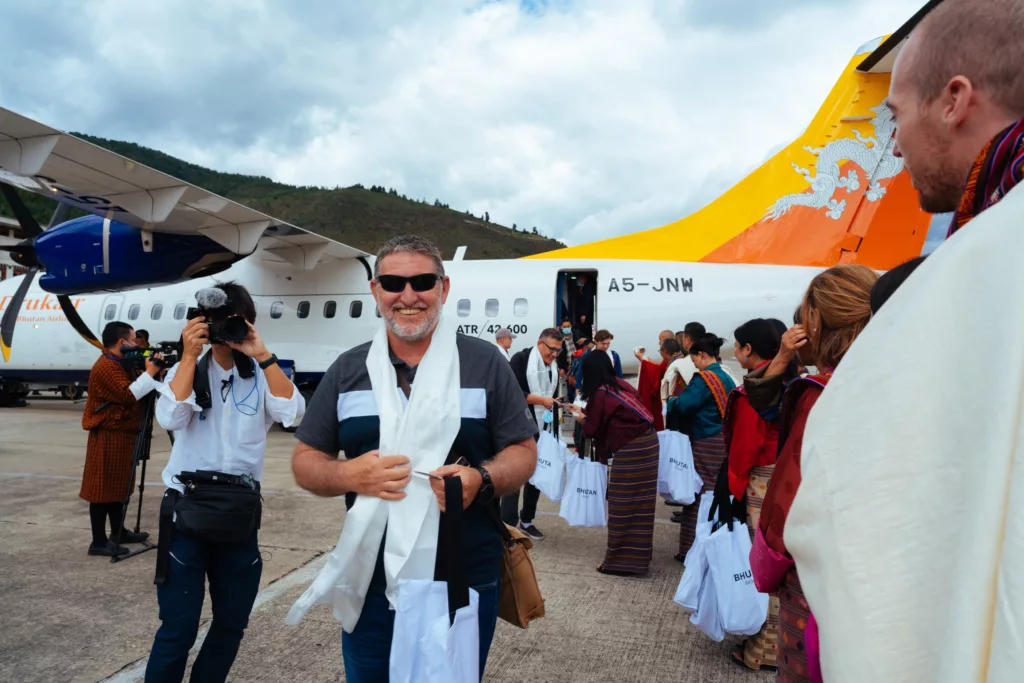
Tourism Transformation Bhutan
“We must also ensure that we are a high-value society, one that is infused with sincerity, integrity, and principles, where people must always live in safe communities, among serene environments and derive comfort from the finest facilities. Typically, “ high value ” is understood as exclusive high-end products and extravagant recreational facilities. But that is not Bhutan. And, “low volume” doesn’t mean limiting the number of visitors.
We will appreciate everyone who visits us to treasure our values, while we also learn as much from them. If that is what you are searching for, there is no limit or restriction. The best conduit to realizing our vision is our youth and professionals in the tourism industry.
While those working in the tourism sector will represent us at the forefront, the entire nation is the tourism industry and every Bhutanese is a host . The minimum fee we are asking our friends to pay is to be reinvested in ourselves, the place of our meeting, which will be our shared asset for generations. Welcome to Bhutan,” H.E Dr. Lotay added.
Enhancements to Bhutan’s sustainable development policies
Bhutan recently announced that it would raise its Sustainable Development Fee ( SDF ) from USD 65 to USD 200 per person, per night, which will go towards projects that support Bhutan’s economic, social, environmental, and cultural development.
The fees raised will fund national investment in programs that preserve Bhutan’s cultural traditions, as well as sustainability projects, infrastructure upgrades, and opportunities for youth – as well as providing free healthcare and education for all.
For instance, some of the Sustainable Development Fee funds go towards offsetting the carbon footprint of visitors by planting trees, upskilling workers in the tourism sector, cleaning and maintaining trails, reducing the country’s reliance on fossil fuels, and electrifying Bhutan’s transportation sector, among other projects.
Tourism Levy Act of Bhutan 2022
As a country that is vulnerable to the effects of climate change (experiencing melting glaciers, floods, and unpredictable weather patterns), Bhutan will also be stepping up its efforts to maintain its status as one of only a handful of carbon-negative countries in the world – in 2021, Bhutan sequestered 9.4 million tonnes of carbon against its emission capacity of 3.8 million tonnes.
“Beyond protecting Bhutan’s natural environment, the SDF will also be directed towards activities that preserve Bhutan’s built and living cultural heritage, including architecture and traditional values, as well as meaningful environmental projects.
Our future requires us to protect our heritage, and to forge fresh pathways for forthcoming generations,” said Mr. Dorji Dradhul, Director General of the Department of Tourism .
“We need tourism to not only benefit Bhutan economically but socially as well while maintaining our low sustainable footprint. The goal of our new strategy is to create high-value experiences for guests, in addition to well-paying and professional jobs for our citizens.
This is our moment of evolution and we invite our guests to become our partners in this transformative moment,” Dradhul added.
Bhutan reopens its borders with new tourism strategy & Infrastructure upgrades
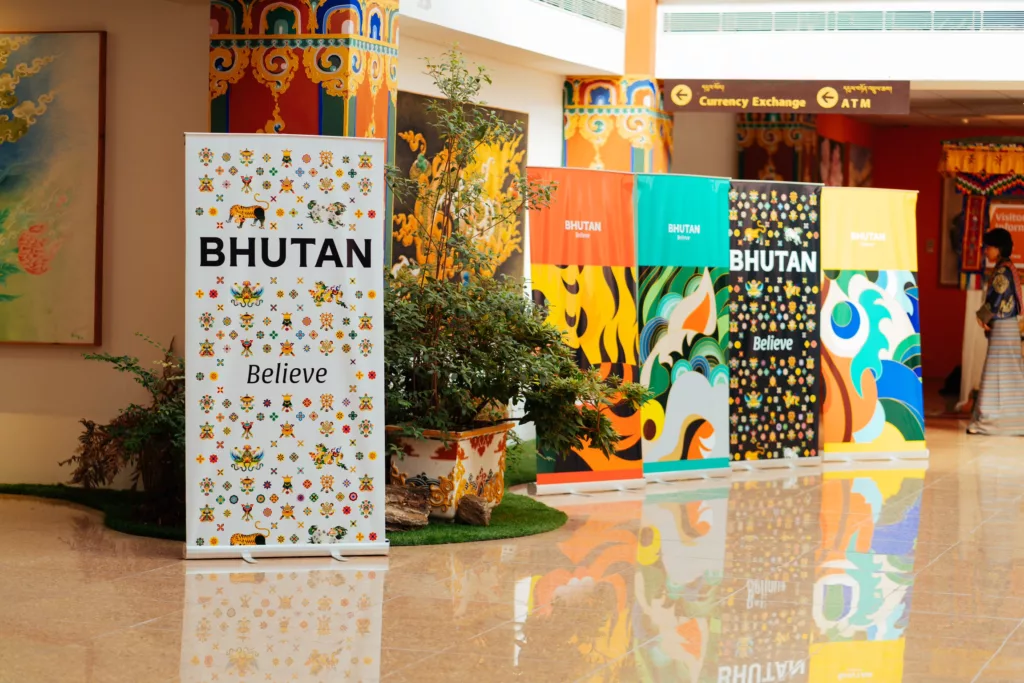
In line with this, the government used the period during the COVID-19 shutdown to upgrade roads, trails, temples, and monuments around the country, upgrade public bathroom facilities, organize rubbish clean-up events, and enhance the standards and certification process for tourism service providers (such as hotels, guides, tour operators and drivers).
Employees across the tourism industry were required to participate in upskilling programs to focus on enhancing service quality.
Bhutan reopens its borders with new tourism strategy & Elevation of the guest experience
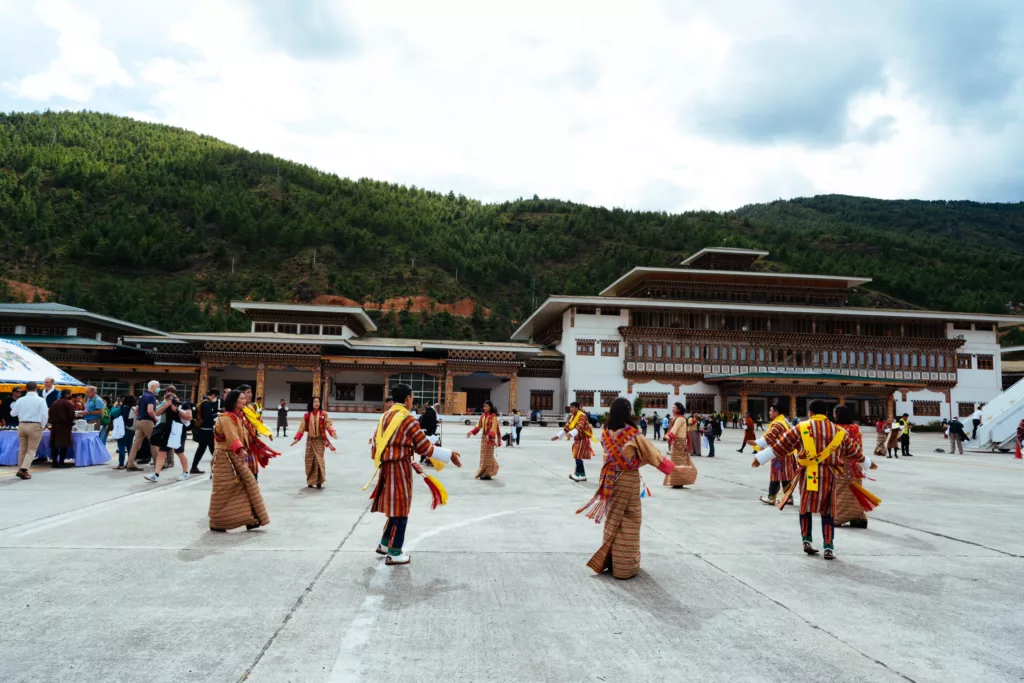
“We know that our new SDF brings with it a certain expectation when it comes to standards of quality and service, so we are committed to enhancing the guest experience – whether that is through the quality of services received or the cleanliness and accessibility of our infrastructure, by limiting the number of cars on our roads, or by limiting the number of people who visit our sacred sites.
By doing so, we protect the experience for visitors to Bhutan, as we must be able to provide authentic experiences supported by world-class services and personal care.
We also plan to work with our tourism partners to continue to upgrade the itineraries that guests can experience in our country – to help showcase the very best that Bhutan has to offer.
We hope that visitors to Bhutan will notice and welcome these changes, and we very much look forward to welcoming all guests to Bhutan,” concluded H.E. Dr. Tandi Dorji, the Minister of Foreign Affairs .
New Tourism Policy of Bhutan 2022
The revamp of Bhutan’s tourism comes amid a widespread ‘transformation project’ rolled out across the country, from the civil service to the financial sector. The changes are geared toward developing Bhutan’s human capital by equipping the population with more proficient skills, knowledge, and experiences.
During a special ceremony in the capital city Thimphu yesterday (September 22, 2022), a new brand for Bhutan was also unveiled by H.E. Dr. Lotay Tshering, Honourable Prime Minister, in the presence of other government officials and dignitaries. ‘ Brand Bhutan ’ aims to capture the optimism and renewed ambition of the kingdom as it opens its doors to guests once again, as well as communicating its promise and plans for its young citizens. Bhutan’s new tagline, Believe , reflects this determined focus on the future, as well as the transformative journeys experienced by its guests.
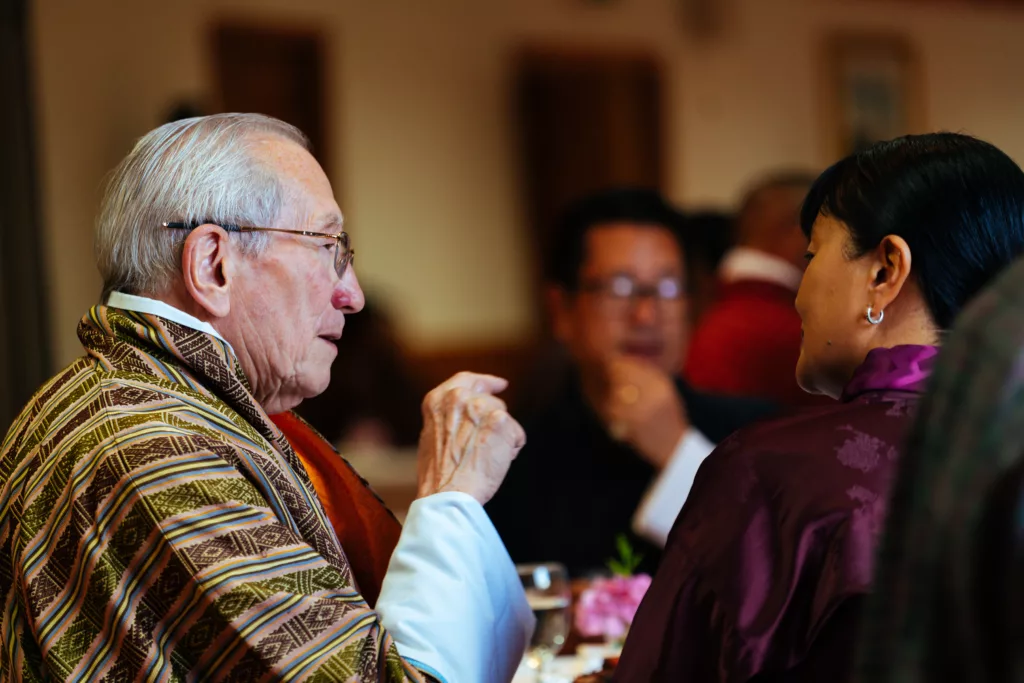
For more information about visiting Bhutan, visit Bhutan Tour By Theme for Our Local Specialist Are Here To Help You Plan The Most Unique Outstanding Tours. Explore the wonders of Bhutan. Once in a Lifetime Experience. Book a Tour Today. 24/7 Customer support. Verified Customer Reviews. Hand-Picked Guides/ Host .
Other changes to the Sustainable Development Fee [SDF]
- The previously stipulated Minimum Daily Package Rate ( MDPR ) has been removed. This gives visitors the flexibility to engage service providers directly, or book flights, hotels, and tours in Bhutan themselves.
- Guests from India will pay a previously stipulated fee, which will be revised at a later date.
- In previous years, the SDF was USD 65 per person (plus a USD 40 per person, per night fee for individual travelers). There will be a concessionary levy of 50% on the SDF for children between the ages of 6 to 12 years, and exemptions of the SDF for children aged 5 years and below.
Privacy Overview

bhutaninbound
Bhutan Best Inbound Tour | Blog
Revised Bhutan SDF
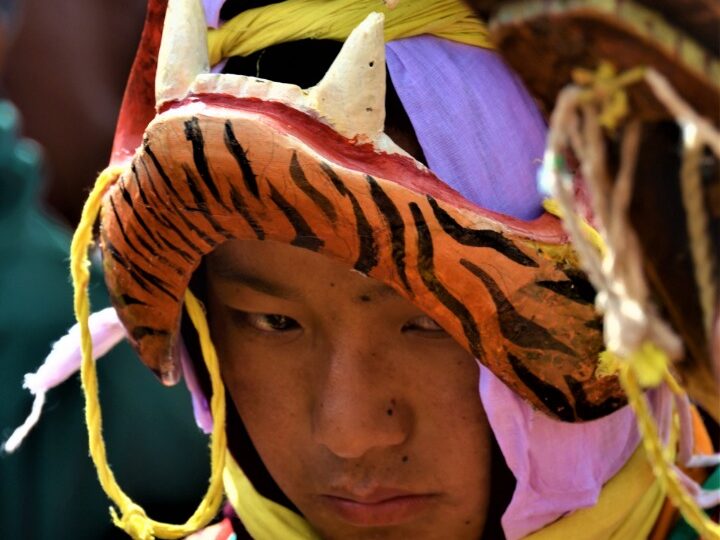
Perhaps no single event in Bhutan’s history has drawn so much international attention as the sudden passing of a bill on Bhutan Sustainable Development Fund . On 27th June 2022, the bill was passed to levy the revised Bhutan SDF for International guests from USD 65 to USD 200. You can read the article here . In the light of the introduction of Bhutan New Tourism policy to Levy the SDF to 200 and introduction of entry fees to monuments, many questions are afloat. We are here to answer your question
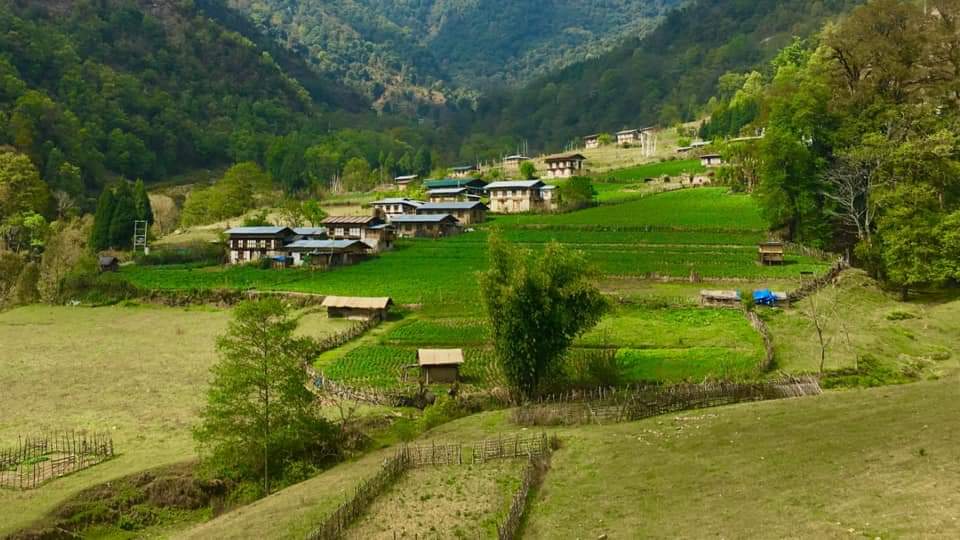
Bhutan Tourism Policy of High Value Low Volume
Bhutan opened up to Tourism in 1974 after it came out of centuries of isolation. However the government adopted a cautious tourism policy from the beginning to avoid negative impacts of mass tourism .
Bhutan’s consistent tourism policy of high value , low impact was crafted to ensure its rich living culture. The kingdom represents a mystical destination left for those seeking a journey back in time. Visitors walk into a rich and vibrant culture still living in the dances and songs, festivals and legends, the art and architecture.
In order to achieve that the number of tourists visiting Bhutan was limited by imposing the Bhutan visit SDF of USD 65 per night. And it was not revised thereafter.
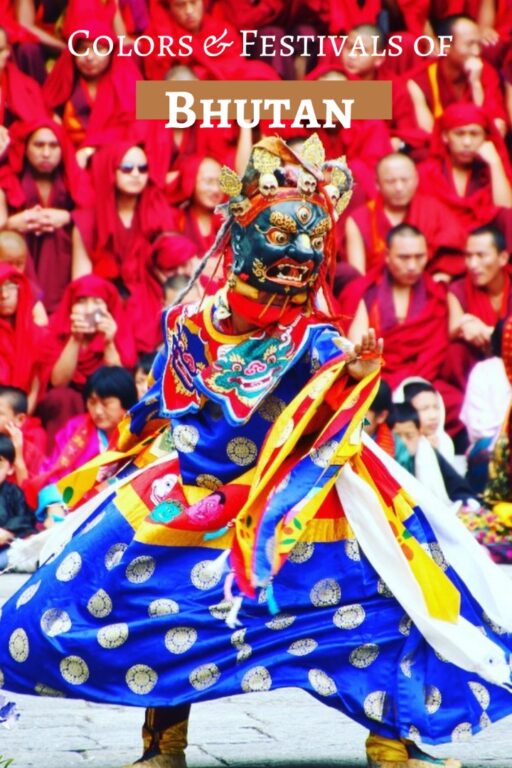
Introduction of Entry Fees to Monument
Bhutan have also increased the entry fees to monuments and Dzongs. This was in pursuance to the 14th meeting of National Monument Committee held on 12th July 2022.
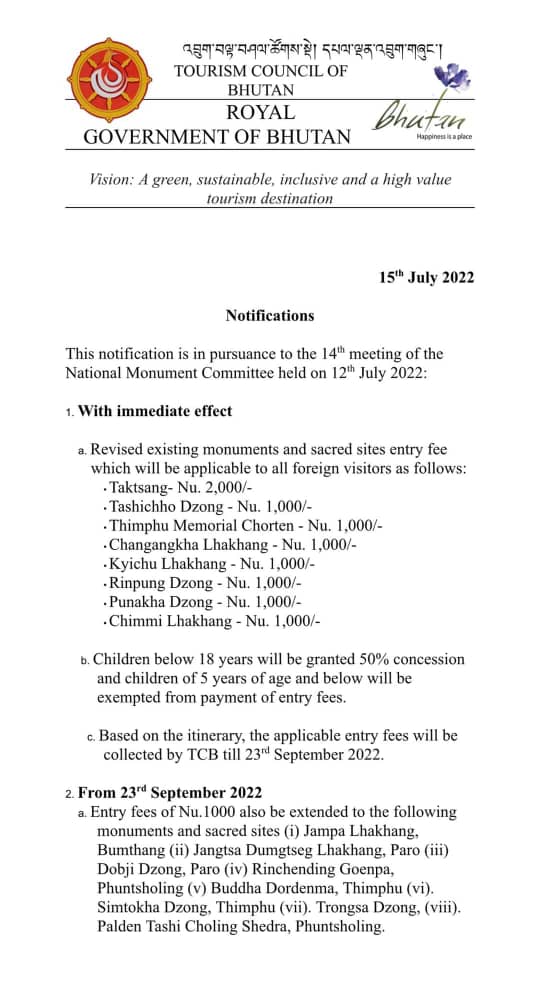
Nu. 1000/person= Aproxim. USD 13/person.
Why now introducing the New Bhutan Tourism Policy?
Bhutan has remained an exotic and intriguing destination for most travelers with a level of mystery that has provided a cachet of curiosity . However, the unsettling and transformative times brought on by human conflict, climate change, and other factors including the Covid-19 pandemic, are forcing countries across the world to rethink and revise travel procedures Bhutan too must take the pragmatic and practical approach to ensure the sustainability initiative adopted by our farsighted kings & to adopt a growth path that is more holistic.
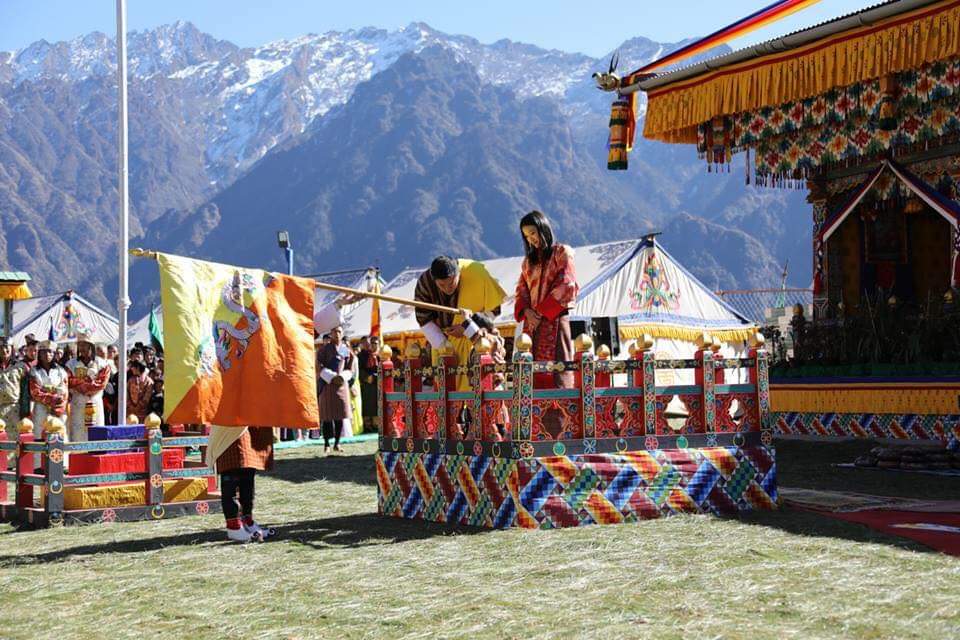
Other Factors to Increase SDF
Bhutan being a small landlocked country had observed the sudden upsurge of tourist visitors. The monasteries were crowded, the sacredness of the sanctity was disrupted & there was an increase in waste.
Bhutan has always prided itself in being the only negative country in the world with 1000 acres of protected areas & as the one who jealously guards its religious & cultural heritage.
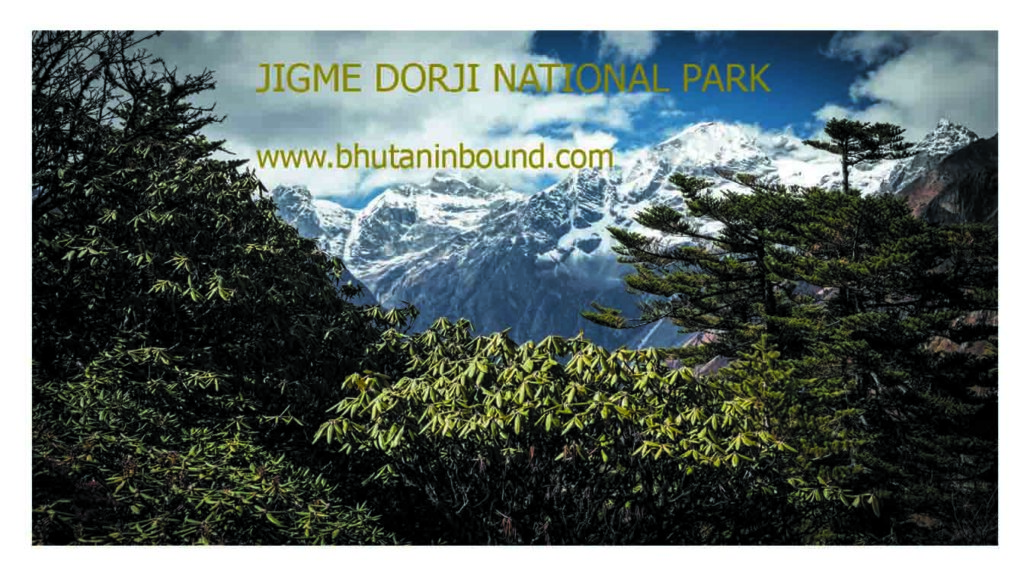
However all these were coming to a threat. Over the period of time there was a glacial recession & growing carbon footprint. So it became inevitable for the government to adopt the cautious tourism policy to avoid the negative impacts of tourism that could have on a small country like Bhutan.
Revised Bhutan SDF
The increase in the SDF to USD 200 was in line with Bhutan’s ‘High Value, Low Volume’ tourism policy. The SDF, however, has exemption on day tourists, who do not travel beyond the first designated point (Border town- Phuntsholing), five-year-olds and below, and children between six and 12 years would receive the concessionary levy rate of 50 percent.
What to expect with the increase in Revised Bhutan SDF
For most people high-end tourism means wealthy visitors who stay in expensive luxury hotels.
When Bhutan introduced the concept of ‘High Value Low Volume Tourism’ , it was not about luxury hotels, fancy restaurants or pothole free roads. Nor it had the intention to target rich clients.
But to give the guest the feel of Bhutan-ness of Bhutan- the uncontrived, authentic and genuine Bhutan experience. We mean quiet treks through pristine forests and not being swamped by the masses. We are also talking about the feel of a society at peace and people who are not intent on ripping-off guests. And We are talking about a taxi driver or shopkeeper who takes the trouble of returning a bag left behind by a passenger or customer.
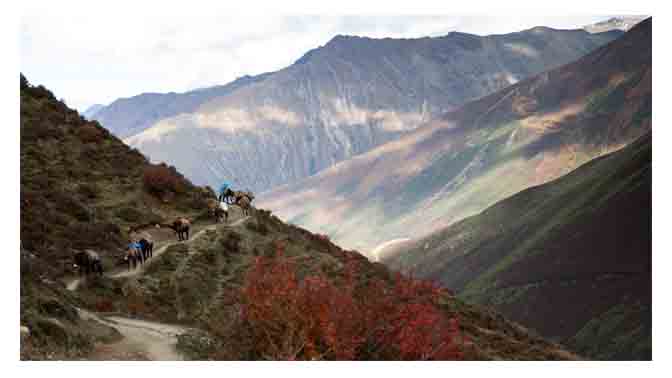
The priority is not marketing Bhutan but managing the quality of the travel experience for both visitors and hosts.
Beneficiaries of Bhutan New SDF
Tourism is one of the biggest assets of the nation. Therefore, all Bhutanese citizens are key stakeholders as enshrined in the Constitution. The renewed vision for the tourism sector deliberately places considerations for the future generation . This is because the economic makeup of the country will be redefined by exciting new drivers of growth.
Reforms in education and skilling, and emphasis on STEM, for example, will help engage youth in high skill industries with the dexterity to navigate and excel in a rapidly-changing technology-driven world.
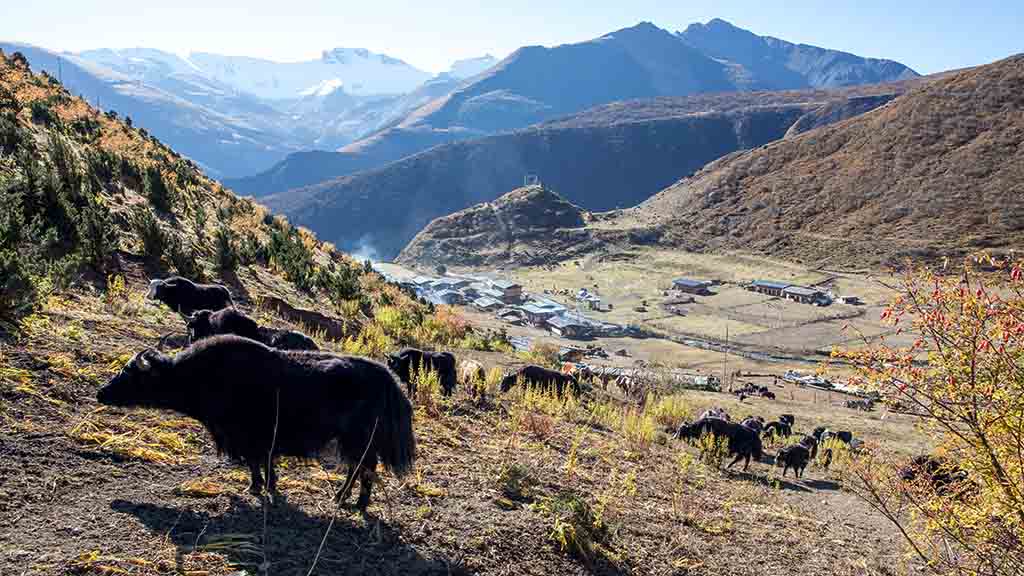
Embrace this nation policy of High value low volume with Bhutan Best Inbound Tour. We are the local tour operators based in Bhutan to offer you the authentic Bhutanese experience.
Discover the sacredness of Bhutan festival
Enjoy the freshness of new trekking routes like trans Bhutan trail
Enjoy the glory of virgin peaks
Challenge yourself for Snowman Trek
Celebrate the rich character of the society in Bhutan
Say hello to the Nomads
Meet the monk on the hill top. Participate in morning chant with them
Explore Bhutan & explore Bhutan
This is what Bhutan aims to offer & this is what we want to offer you. . . . Its Magic & Mystery
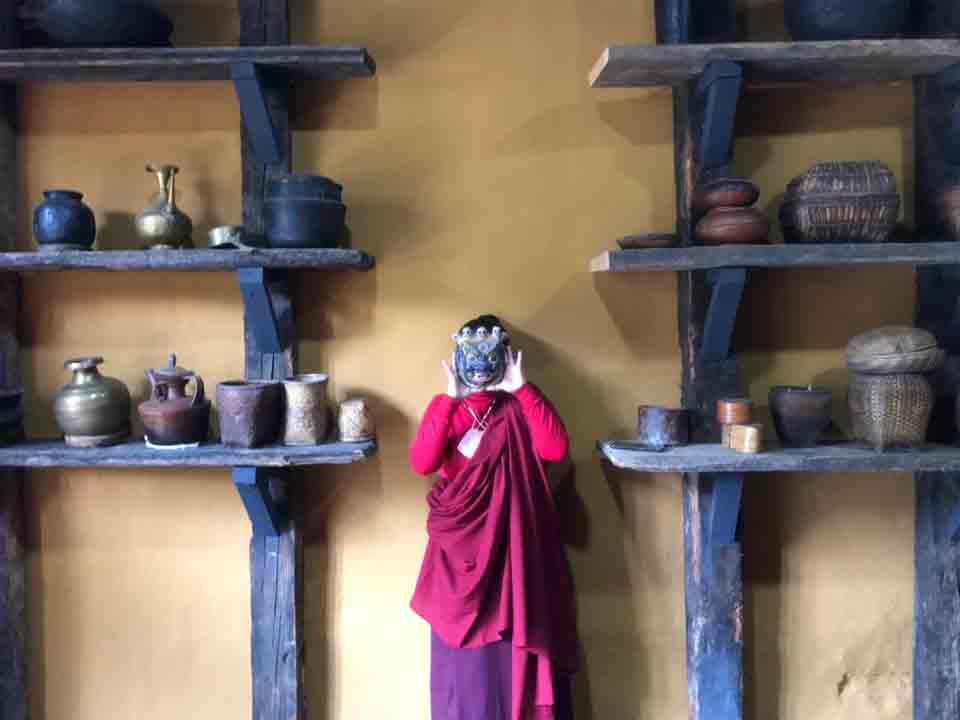
(Kuensel,Dasho Kinley Dorji)
Bhutan Best Inbound Tour is a Bhutan Travel company and is a registered Bhutan Tour operators company under the umbrella of the Tourism Council of Bhutan. We handle all kinds of travel arrangements including Bhutan Visa, Bhutan Flight, Bhutan Itinerary design and Hotel booking. With a belief in quality and services, Bhutan Inbound is a reliable and efficient travel organizer in Bhutan for foreign and domestic tourists, business travelers, special interest visitors and events. Our professionals toil hard to achieve complete client satisfaction through their par-excellence knowledge and experience. Some of the most popular package that we offer are 1.Cultural Tour Package 2.Bhutan Festival Package 3.Family Friendly Tours 4.Bhutan Trekking 5.Off The Beaten Path 6.Luxury Tours
WHY WE ARE BEST We are recognized by the Tourism Council of Bhutan, Association of Bhutanese Tour Operators. Moreover we are also appreciated by various corporate and world tourists for offering impeccable services. We are rated No. 1 Tour Operator in the nation by Trip Advisor and branded as Excellent by TourRadar. We have long-term associations with excellent hotels and resorts, rendering our guests an amazing experience. The vehicles provided are all luxurious, catering to the comforts of our guests . Furthermore we have professional drivers who ensure a smooth ride over the curvaceous mountainous terrain of Bhutan.
Contact us for any Bhutan Tour/ Travel service at [email protected] or [email protected]
Call : +975-17114437
Email : [email protected], tourism policy 2021.
The Tourism Council of Bhutan(DOT) is pleased to announce the Tourism Policy of the Kingdom of Bhutan 2021. The policy envisions promoting Bhutan as a green, sustainable, inclusive, and high-value tourism destination guided by the policy of ‘High-value, Low volume’ tourism to contribute to the overall socioeconomic development of the country. The policy sets the agenda and direction for sustainable tourism development in the country through key reform measures and institutional strengthening. Tourism has the potential to create greater benefits across its diverse value chain benefiting various sections of society. It is important that the type of tourism and the reforms thereof are in the larger interest and future benefits of the industry and country.
Further, given the multi-sectoral nature of the tourism industry, it is important that engagement, partnerships, and collaborations at all levels are strengthened and tourism-friendly sector policies and plans are given the highest consideration by the sector stakeholders for tourism to grow and benefit all. Tourism is a strategic and valuable asset like any other natural resource for the country and people and hence critically important to harness its benefits in a sustainable manner, acceptable to our society and strengthening rather than undermining our nature, culture, tradition religion, and more importantly to avoid short term quick material gains. The current COVID-19 pandemic has created unprecedented impacts on people and economics with tourism being one of the most impacted. It has also given us the opportunity to rethink, review, and reset to become more robust and resilient as we strive toward recovery. The promotion and development of sustainable tourism are even more relevant in the current context of the pandemic. It is now important for us to build on the foundation that we have with robust reforms that will bring greater benefits for all through sustainable and inclusive tourism. It is my sincere hope that the Tourism Policy of the Kingdom of Bhutan , 2021 will guide and benefit the industry stakeholders and the country in promoting sustainable tourism. Lyonpo Dr.Tandi Dorji,

Table of Contents
Bhutan Tourism Policy 2021 Glossary
- Tourism : Refers to the activity of a visitor and includes trips away from one’s usual environment (residence) for any purpose other than employment by a resident entity in the place visited. The duration of stay shall be as prescribed by the Immigration Act of the Kingdom of Bhutan .
- Tourist : Refers to all visitor who travels to a country (inbound/outbound tourism) or place (domestic tourism) other than that in which he/she has his/ her usual residence, and whose purpose of the visit is other than employment by a resident entity in country/place visited. The duration of stay shall be as prescribed by the Immigration Act of the Kingdom of Bhutan.
- Domestic Tourism : Comprises the tourism activities of a resident within the country of reference.
- Inbound tourism : Comprise of tourism activities of non-resident visitors within the country of reference on an inbound tourism trip.
- Outbound Tourism : Comprises the tourism activities of a resident of a country outside the country of reference.
- Tourism Industry : Is a cluster of production units in different industries that provide consumer goods and services for visitors. Such industries are called tourism industries because visitor acquisition represents a significant share of their supply that, in the absence of visitors, their production of these would cease to exist in meaningful quantity. This includes accommodation, travel, food and beverage services, guiding services, national parks, museums, entertainment, etc.
- Minimum Daily Package Rate (MDPR): Refers to the minimum rate paid by all leisure tourists for an all-inclusive package tour to Bhutan. This includes the Sustainable Development Fee component and payment for the all-inclusive service package (accommodation, meals, guides, and ground transport within Bhutan). The current MDPR is USD 250 per person per night during the months of March, April, May, September, October, and November and USD 200 per person per night during other months of the year (December, January, February, June, July, and August). For both periods the SDF is fixed at $65 per person per night. The MDPR will not apply to countries granted exemptions by the RGOB which currently includes nationals of Bangladesh, India, and Maldives. However, for this category of leisure tourists, an SDF will be applied. The SDF will be determined by the RGOB based on the need to manage the pressures on our society, culture, and environment.
- Sustainable Development Fee (SDF): Refers to the tourism levy on all leisure tourists per person per night and is applicable throughout the year as a contribution towards sustainable development initiatives undertaken by the Government and to compensate for the negative environmental impacts associated with tourism.

The SDF is levied as per the Tourism Levy Act of Bhutan 2020.
- Ecotourism : High value, Low impact travel that supports the protection of cultural and natural heritage; provides positive and enriching experiences for visitors and hosts; assures tangible benefits to local people; and contributes to the pillars of Gross National Happiness . (Ecotourism Development in the Protected Areas Network of Bhutan Guideline, 2012 Nature Recreation and Ecotourism Division, MoAF / Department of Tourism)
- Green : Refers to activities that have a low carbon footprint are eco and energy efficient and contribute to the conservation and preservation of our environment.
- Sustainable : Promoting tourism in a manner that will meet the needs of the present tourists, destinations, and citizens while protecting and enhancing their needs and opportunities for the future. High-value destination : Creating good value for money, revenue and yield, quality infrastructure, tourism products and services, high-quality experiential tourism, and Brand Bhutan.
- Inclusive : Refers to creating opportunities for participation in tourism and sharing of benefits for all Bhutanese and travelers including vulnerable sections of the society.

Introduction
Bhutan’s participation in the international tourism industry began with the first group of 287 tourists visiting Bhutan in 1974. This was preceded by the adoption of the first rules governing tourism in the country in 1972. Since then, Bhutan’s tourism industry has followed a uniquely sustainable approach of High Value, Low Volume, mindful of tourism’s contribution to socioeconomic development and the negative impacts associated with it. The premise of our tourism policy is rooted in the overall development philosophy of Gross National Happiness and seeks to promote sustainable tourism that meets the needs of present visitors and destinations while enhancing and ensuring opportunities for the future. Bhutan has consistently sought to ensure a cautious tourism industry growth that is within the carrying capacity of our physical, socio-cultural, and natural environment. Bhutan’s tourism industry continues to grow to become one of the major economic sectors contributing significantly towards the socioeconomic development of the country through revenue and foreign currency generation and employment creation amongst others. In 2019 Bhutan recorded a total of 315,599 visitors which is an increase of 15% over 2018. While Bhutan has benefitted immensely from the growth in the tourism sector, it is also faced with challenges particularly associated with the substantial increase in the volume of tourists. The growth in the industry has also been accompanied by social, cultural, and environmental issues, which are anticipated to grow in the future.
Further, the shift and sophistication in the demand and behavior of tourists for meaningful travel experiences also necessitate the need for growth and diversification of tourism products and destinations, including authenticity, contacts with local communities, and learning about culture, tradition, flora, and fauna, etc. This calls for a sustainable approach to tourism development which requires the informed participation of all relevant stakeholders. It requires maintaining a high level of tourist satisfaction and ensuring a high-value experience for the tourists, raising awareness about sustainability issues, and promoting sustainable tourism practices amongst tourists, and the service providers. It is of utmost importance to undertake constant monitoring of impacts, introducing the necessary preventive and /or corrective measures where necessary. Hence a dynamic tourism policy to change and adjust to these changing demands of international travel and tourism has become necessary.

The travel and tourism industry in Bhutan and around the world has undergone significant growth and changes particularly with the changing dynamics of traveler behavior and the travel markets. These developments and the absence of documented comprehensive policy framework have resulted in challenges relating to policy clarity, planning, and coordination for the development, promotion, and regulation of the tourism industry. Bhutan recorded a total of 315,599 visitor arrivals in 2019, of which 72,199 consisted of arrivals from MDPR-paying countries while 242,947 constituted those from countries exempted from paying MDPR. While the government has been undertaking initiatives to promote tourism in all regions of the country, the visitations are largely concentrated in the western region. Visitor arrivals trend over the past years shows that tourist visitation is mainly confined to the western region of Paro, Thimphu, and Punakha. More than 80 % of the total bed nights are spent in the Western region. This was followed by the central circuit while the Eastern and Southern Circuits received the least number of tourists and the least share of the total bed nights. This has been attributed to limited infrastructure and support facilities, a lack of awareness, and information on the tourism products available in other areas amongst tourists and service providers.
For instance, 70 percent of the TCB-accredited tourist accommodations are located in the western region mainly in Thimphu, Paro, Punakha and Wangduephodrang Dzongkhags. The 6 eastern districts have a minimal number of star-rated hotels. Similarly, the Southern circuit has the least number of tourist accommodations and the existing ones are all located in Phuntsholing/Chukha except for one in Tsirang. Other tourism services such as rental services for cars, trekking, cooks, and guides are also all concentrated in the western region. While the issue of seasonality has been improving, efforts are still required to promote Bhutan as a year-round destination. The highest number of arrivals is in April, May, and October. The number of visitors drops to around 4% of the total arrivals during the months of February and July. Tourists from the USA, China, Singapore, Thailand, Japan, the United Kingdom, and Germany continue to be the major contributors to the tourism industry among those who pay the MDPR.
More than half of the international tourists were from Asia-Pacific followed by 24.8 percent from Europe and North America. In terms of volume, tourists from Bangladesh, India, and Maldives dominate the market. The growing popularity of Bhutan as a travel destination has resulted in increasing arrivals mainly from the countries in the region. However, with our limited infrastructure and carrying capacity, it has become increasingly challenging to maintain our policy of High value, Low volume and ensure an authentic and quality experience for tourists.

The increasing number of visitors has also resulted in the following emerging issues:
- Congestion at tourist sites and highways,
- Increased vehicular movements and safety of unguided tourists resulting in accidents and deaths,
- Quality of services provided including accommodation,
- Impact/pressure on social infrastructure,
- Revenue leakages,
- Growth in non-certified tourist facilities,
- Unethical business practices and unethical/unacceptable social and cultural concerns,
- Growing waste and environment concerns.
The efforts of the Government to address the above issues are constrained without a comprehensive policy. There is no clear direction on how to manage and regulate the unprecedented growth of visitors. In the absence of a tourism policy, the Economic Development Policy (2016) guides the tourism industry development based on which the Fiscal Incentives (FI) 2017 was developed. The FI 2017 provides incentives to the tourism sector in terms of direct tax exemption in the form of income tax holidays for tourist standard hotels and farmhouses/homestay and indirect tax exemption in the form of sales tax and customs duty exemptions to tourist operators for buses, adventure and recreation equipment and furniture, kitchen equipment, and fittings for tourist standard hotels. There is an urgent need for a Tourism Policy to set the agenda and direction for the development of the tourism industry and manage its intended and unintended consequences. The DOT shall develop rules, regulations, and guidelines including a comprehensive Strategic Development Plan for the implementation of this policy.

Title, Commencement, and Application Title
This Policy shall be known as the “ Tourism Policy of the Kingdom of Bhutan 2021 ”.
- Commencement : This Policy will come into force from the 22nd Day of the 11th Month of the Male Iron Rat Year of the Bhutanese calendar, corresponding to the 5th day of the first month of the year 2021, and remain in force until superseded or amended.
- Application : All matters relating to tourism shall be governed by this Policy and the relevant laws of the Kingdom of Bhutan.
Guiding Principles
The guiding principles which underpin Bhutan’s vision for sustainable tourism are:
- Develop and promote forms of tourism that are consistent with our national development philosophy of Gross National Happiness.
- Promote High value, Low volume tourism
Refers to targeting mindful and responsible visitors, creating good value-for-money experiences, high revenue and yield, quality infrastructure and tourism products and services, and Brand Bhutan. While ensuring that the number of tourists Bhutan receives is consistent with the absorptive carrying capacity of our natural endowment, socio-cultural values, and infrastructure and does not exacerbate our vulnerabilities as a small nation.
- Promote tourism that does not undermine national security and does not erode our tangible and intangible cultural heritage and environment.
- Promote inclusive and equitable growth.
- Ensure sustainable tourism development.

Vision
A green, sustainable, inclusive, and a high-value tourism destination
The objectives of the Tourism Policy of the Kingdom of Bhutan are:
- To promote Brand Bhutan;
- To increase the contribution of tourism to the national economy;
- To enhance rural livelihoods;
- To strengthen institutional structures, partnerships, and collaborations;
- To promote professionalism and excellence in the industry; and
- To promote sustainable tourism in Bhutan.
Policy Statements
The Tourism Policy of the Kingdom of Bhutan seeks to achieve the vision and objective through the following policy statements. The policy statements are identified under different strategic domain areas of intervention.
Sustainable Tourism Development
- The RGOB will continue to pursue a policy of High value, Low volume tourism, where tourism will contribute towards socio-economic development while ensuring the negative impacts associated with tourism are avoided or mitigated.
- The RGOB shall adopt a comprehensive approach for the development, promotion, and management of tourism and tourist in the country to work towards a single tourism system by 2030.
- In order to ensure that the number of tourists is within manageable limits to avoid issues and concerns associated with mass tourism, the RGOB shall manage and regulate the volume of tourism through the following mechanisms:
- a) Adoption of appropriate pricing and other mechanisms such as SDF and MDPR.
- b) All leisure tourists except those from countries granted exemptions by the RGOB will have to pay the MDPR which includes the SDF component and payment for the all-inclusive service package which includes accommodation, meals, guides, and ground transport within Bhutan.
- c) The MDPR will not apply to countries granted exemptions by the RGOB which currently includes nationals of Bangladesh, India, and Maldives. However, for this category of leisure tourists, only SDF will be applied. The SDF is different from any other fees.
- d) The SDF shall be a tourism levy to compensate for the negative environmental impacts associated with tourism. It will not cover the expenses related to the visits such as accommodation, food, travel, and other tourism-related services and SDF shall be different from any other fees.
- e) The SDF and MDPR will be revised and determined by the RGOB based on the need to manage the pressures on our society, culture, and environment.

The implementation of the SDF shall be guided by the Tourism Levy Act of Bhutan 2020.
- To enhance experience, wellbeing and safety of the tourists, the God shall develops and implements rules, regulations, and guidelines for the management of tourists from those countries who are exempted from paying the MDPR. The guidelines will cover the organization of trips through Bhutanese ground handlers, travel facilitation, streamlining and easing of travel processes, etc.
- To address environmental and safety concerns including traffic congestion and vehicular accidents, the RGOB shall adopt and implement guidelines for the regulation of domestic and foreign vehicles including two-wheelers used for tourism purposes.
- To contribute towards sustainable and inclusive development, the RGOB shall promote ecotourism.
- The RGOB shall open new areas and sites for tourism only upon taking into consideration the impacts on ecology, values, significance, and sentiments of the local communities and sites.
- To avoid congestion and ensure quality visitor experiences, the RGOB shall implement mechanisms including management plans at selected tourist sites and places of religious, cultural, and natural significance.
- In order to mitigate potential negative impacts, the TCB in collaboration with relevant stakeholders shall assess the absorptive carrying capacity of selected sites and places that are vulnerable to negative social, environmental, cultural, or other impacts associated with over-tourism.
- The TCB in collaboration with relevant stakeholders shall institute mechanisms to conserve and promote natural and cultural heritage.
- Mechanisms will be developed to compensate for the economic opportunities foregone by communities living in places that are protected and conserved for purposes such as eco-tourism by prohibiting development activities.
- The TCB in collaboration with relevant stakeholders shall enhance initiatives to promote the management of waste produced by the tourism sector.

7.2 Positioning Tourism in Development Policies and programme
- 1. The RGOB shall position tourism in the national development planning and strategies given its contribution to the economy.
- 2. The RGOB shall integrate requirements related to tourism into the sector policies and plans.
- 3. The RGOB shall strengthen the collection, storage, analysis, use, and dissemination of data and statistics related to tourism for purposes of the development of the industry.
7.3 Strengthen Tourism Governance and Institutional Setup
- The TCB shall continue to be the apex tourism organization responsible for the development, promotion, and regulation of tourism.
- a) Budgeting, planning and policy formulation and implementation
- b) Regulation and monitoring of the industry
- c) Facilitation and coordination
- d) Development, promotion and branding of tourism products and services
- e) Human resource development
- f) Certification and accreditation of tourism services and facilities
The RGOB shall strengthen tourism governance and institutional set-up through the following:
- a) Develop and/or Strengthen legislation or regulatory frameworks for tourism.
- b) Provide adequate resources and manpower including skills enhancement and upgradation
- c) Strengthenandexpandtourismrepresentationwithinthecountryandin major international markets through the Bhutan missions abroad.

7.4 Improvement of Tourism Products and Investment Environment
- a) Targeted performance-based incentives and facilitate land leases for tourism infrastructure.
- b) Enhanceandimprovetravelfacilitationservicesbystreamliningprocesses and improving efficiency in the delivery of services.
- c) Streamlinealltourismbusinessesandservicesestablishment, operations, and regulatory compliance through the TCB.
- d) Streamline and simplify processes for tourism businesses.
- e) Collaborate with relevant stakeholders to leverage information and communication technology through the implementation of a tourism ICT Master Plan to promote tourism, service delivery, and visitor experience enhancement such as online payment facilities.
- f) Improve access to and within Bhutan by improving and expanding air and road connectivity which may include opening an alternate international airport.

2. TCB in collaboration with relevant stakeholders shall improve tourism products and offerings to enhance the visitor experience through the following mechanisms:
a. Diversify tourism products with special emphasis on unique offerings and comparative advantage taking into consideration needs for geographical spread and year-round tourism. This shall include but not be limited to:
- Development of new tourism clusters with appropriate services
- Nature-based tourism
- Community-based tourism / village tourism / rural tourism/ Agrotourism
- Ecotourism
- Local cuisines, arts and crafts, and traditional medicine.
- Promotion of Bhutan as a destination for filming as per relevant laws
- Wellness, spiritual and MICE tourism
- Adventure and recreational tourism.
- Festivals and sacred tourist sites
- Sports tourism.
- Develop procedures, guidelines, regulations, and standards to ensure systematic and planned development of sustainable products.
- Strengthen and improve current tourism product offerings, packaging, and content development.
- Strengthen the quality of tourism products and infrastructure operations with standards and monitoring.
- Promote domestic tourism by developing products and services catering to the needs of the resident tourists.
a. Develop and implement Brand Bhutan strategies to differentiate Bhutan from the competing destinations. b. Strengthen the promotion of Bhutan as an exclusive destination through innovative marketing and communication strategies.
- The DOT in collaboration with relevant stakeholders shall develop and implement a sustained tourism education and awareness campaign for the national audience.
- The RGOB shall identify and develop tourism zones across the country to promote coordinated and sustainable development of tourism products and infrastructure.

7.5 Seasonal and Geographical Spread of Tourism 1. The RGOB shall undertake the following measures to promote tourism as a year-round activity: 2. The RGOB shall undertake the following measures to encourage the spread of tourism activities in tourism-deficient regions of Bhutan:
7.6 Standard and Quality
- The RGOB shall improve services and offer greater choices for visitors by creating conditions to allow more competition.
- To prevent revenue leakages and misuse of tourism payment systems and improve payment for services, the RGOB shall develop/integrate e-platforms for tourism business operations and practices such as licensing, disbursement of payments, tax filing, etc.
- To achieve excellence in the standard and quality of tourism facilities and services, the DOT in collaboration with relevant stakeholders shall establish certification systems and standards.
- To ensure safety of tourist,appropriate mechanisms shall be developed and implemented.
- To ensure access to timely and quality health services all tourists will be encouraged to have travel/health insurance.
- The DOT in collaboration with relevant stakeholders shall devise standard systems for crisis and emergency preparedness, management, and response.
- To promote excellence and professionalism in the delivery of services by guides, tour operators, hoteliers, and other tourism service providers, the DOT in collaboration with relevant stakeholders shall ensure compliance with standards and a code of ethics.
- The RGOB shall implement regulations to discourage unhealthy growth and development in the tourism industry.
- The DOT in collaboration with relevant stakeholders shall prevent any form of exploitation including that of vulnerable groups, women, and children in the sector and tourism facilities and establishments.
7.7 Human Resource Development
- The RGOB shall encourage and facilitate the development of a professional and competent workforce and the availability of a skilled workforce in the industry as per existing laws.
- The TCB in collaboration with relevant stakeholders shall develop human resource development plans and actions to address skills gaps and training needs.
- The TCB in collaboration with relevant stakeholders shall ensure the professional quality of institutions providing training in tourism through the development of quality assurance mechanisms.
7.8 Partnerships and Collaborations
- The RGOB shall promote partnerships and cooperation on tourism: a) With other countries and international organizations. b) At national, regional, and community levels.
- The TCB in collaboration with relevant stakeholders shall strengthen and support relevant stakeholders, tourism associations and networks.
- The RGOB shall promote public-private partnerships in tourism.
7.9 Inclusive and Integrated Tourism 1. The TCB in collaboration with relevant stakeholders shall promote inclusive and integrated tourism through:
8 Role of Stakeholders A responsible collaborative approach will enable the promotion of tourism that is economically viable, environmentally sustainable, and culturally acceptable. The implementation of the policy will be a shared responsibility. Every stakeholder including the visitor, comprising of the following but not limited to:

9 Formulation, coordination, and implementation
- TCB shall lead the implementation of this policy in collaboration with other stakeholders.
- All tourism-related initiatives by sectors shall be undertaken in consultation with TCB.
- All tourism-related initiatives by the private sector shall be routed and endorsed by TCB.
- The TCB in collaboration with relevant agencies, Local Governments, and sector associations shall implement this policy.
- An action plan will be developed to implement this policy and implementation shall be undertaken with the support of the government.
10 Monitoring and Evaluation
- The TCB in collaboration with partner agencies and stakeholders shall implement this policy and regular monitoring and evaluation of the implementation shall be undertaken.
- The monitoring and evaluation of the policy shall be based on the implementation of the action plan developed by the TCB
- The TCB shall conduct periodic monitoring and evaluation of plans, programs, and policies related to tourism.
11 Amendment
- This Policy will come into force from the 22nd Day of the 11th Month of the Male Iron Rat Year of the Bhutanese calendar, corresponding to the 5th day of the first month of the year 2021, and remain in force until superseded or amended.
- The TCB in collaboration with other relevant agencies shall review this policy at least once every five years and revise it if necessary.
- In the event of a conflict of interpretation of any part of this policy, the TCB shall be the authority to interpret the provisions of the Policy which shall be final and binding.

The policy of ‘High-value, Low volume’ tourism in Bhutan envisions promoting the country as a green, sustainable, inclusive, and high-value tourism destination. It aims to contribute to the overall socioeconomic development of the country by setting the agenda and direction for sustainable tourism development through key reform measures and institutional strengthening. The policy is focused on promoting tourism that is sustainable, inclusive, and of high value, with a low impact on the environment and culture of the country.
Bhutan promotes sustainable tourism by setting a minimum daily package rate (MDPR) for all leisure tourists, which includes the Sustainable Development Fee (SDF) component and payment for the all-inclusive service package, such as accommodation, meals, guides, and ground transportation within Bhutan . The SDF is a tourism levy on all leisure tourists, which is applicable throughout the year as a contribution towards sustainable development initiatives undertaken by the Government and to compensate for the negative environmental impacts associated with tourism. The country also practices ecotourism, which is high value, low impact travel that supports the protection of cultural and natural heritage, provides positive and enriching experiences for visitors and hosts, assures tangible benefits to local people, and contributes to the pillars of Gross National Happiness .
The minimum daily package rate (MDPR) for leisure tourists in Bhutan is USD 250 per person per night during the months of March, April, May, September, October, and November and USD 200 per person per night during other months of the year (December, January, February, June, July, and August). This rate includes the Sustainable Development Fee (SDF) component and payment for the all-inclusive service package, such as accommodation, meals, guides, and ground transport within Bhutan.
The Sustainable Development Fee (SDF) in Bhutan is levied as per the Tourism Levy Act of Bhutan 2020. The fee is determined by the Royal Government of Bhutan (RGOB) based on the need to manage the pressures on society, culture, and environment. The SDF is a tourism levy on all leisure tourists, which is applicable throughout the year as a contribution towards sustainable development initiatives undertaken by the Government and to compensate for the negative environmental impacts associated with tourism.
The current COVID-19 pandemic has had unprecedented impacts on people and economics with tourism being one of the most impacted. The pandemic has led to a significant decline in the number of tourists visiting Bhutan , which has affected the country’s tourism industry and its socioeconomic development. However, the pandemic has also given Bhutan the opportunity to rethink, review, and reset its tourism policies and practices to become more robust and resilient as it strives towards recovery. In this context, the promotion and development of sustainable tourism are even more relevant, and it is important to build on the foundation that exists with robust reforms that will bring greater benefits for all through sustainable and inclusive tourism.

Northeast India News, Assam News, Breaking News of Northeast | Latest News Live | EastMojo
How fair is the discontent over Bhutan’s new tourism policy?

In February 2020, a Lower House of the Parliament in Bhutan announced that from July 2020, visitors from India, Bangladesh and Maldives have to pay a fee of Rs 1200 per day. The announcement was met with cynicism and anger by the border people and some sections of the media. This fee considered a ‘Sustainable Development Fee’ is to check the mass inflow of tourism from the region to preserve Bhutan’s rich ecology and culture. However, it couldn’t be implemented due to the outbreak of the COVID-19 pandemic as Bhutan secured its gates to prevent the spread of the virus in the country. As the situation is gradually returning to normal, Bhutan opened its doors to tourists again on September 23 after a hiatus of two years. In this article, we briefly discuss the discontent emerging in the Indo-Bhutan border after the latter implemented the new tourism policy.
‘High Value, Low Impact’
Bhutan’s Tourism Policy stands for ‘High Value, Low Volume’ to promote the country as an “exclusive travel destination based on the values of Gross National Happiness (GNH)”. The Royal Government of Bhutan believes that while tourism provides opportunities to deepen friendly relationships and promote cultural exchange it should be based on the principle of sustainability. Meaning tourism that is socially and culturally acceptable, environmentally and ecologically just and economically feasible.
Bhutan’s Tourism Rules and Regulations – 2002 enumerates a plethora of guidelines that the tourists as well as those associated with the tourism industry in the country have to comply with. To uphold the country’s tourism policy, it levies a fee known as Sustainable Development Fee (SDF). The Tourism Council of Bhutan defines SDF as a “tourism fee levied on all tourists per person per night and…as a contribution towards sustainable development initiatives undertaken by the Royal Government to compensate for the negative environmental impacts associated with tourism”.
Trending Stories

Latest Stories

Leave a comment
Leave a comment cancel reply.
Disclaimer: Stories/articles published under EM Buzz (eastmojo.com/em-buzz) are provided by third parties and EastMojo.com has no direct relation with these articles.
You are using an outdated browser. Please upgrade your browser to improve your experience.
New Tourism Policy of Bhutan
- Travel Guide Foreign Tourist
- Discounts for Bhutan Packages
- Find Best Travel Company in Bhutan
- Best Time to Visit Bhutan
- How to Book Bhutan Tour
- How to Book Flight Tickets to Bhutan
- Best Holidays in Bhutan
New Tourism Policy of Bhutan ⇒ SDF for international tourists USD 100/person/night ⇒ SDF for Bangladeshi tourists USD 100/person/night ⇒ SDF for Maldivian tourists USD 100/person/night ⇒ 50% off on SDF for children between 6 years to 12 years ⇒ NO SDF for children 5 years & below ⇒ USD 40 one-time visa fees per person for international tourists ⇒ Tourists can choose to stay in any TCB approved hotels (meals optional) ⇒ Valid passport mandatory for all tourists visiting Bhutan ⇒ Approved hotel booking and tour guide is mandatory for your travel in Bhutan ⇒ No Season & Off Season (Bhutan is all year around destination) ⇒ No fixed surcharge for one or two persons traveling together ⇒ No Group discounts or any other discounts available
If you still have doubts or confusion, please feel free to contact us at +975 17617107
See you in Bhutan.
Travel Guide Foreign Tourist . Best Time to Visit Bhutan . Discounts for Bhutan Packages . Find Best Travel Company in Bhutan . How to Book Bhutan Tour . How to Book Flight Tickets to Bhutan . How to Find Best Holidays in Bhutan . New Tourism Policy of Bhutan
Know more about Bhutan. Travel Guide Foreign Tourist . Travel Guide Indian Tourist . Travel Guide Regional Guest . Tour Operators in Bhutan . Tour Booking Conditions . Bhutan Flights . Sightseeing Places of Bhutan . Day Hikes in Bhutan . Best Places to Visit . Tourist Information Center . Wellness Tourism in Bhutan . Helicopter Ride in Bhutan . Festivals in Bhutan . Get Your Bhutan Visa . Payments to Bhutan . Foods & Restaurants . Foreign Celebrities Bhutan . OMG My Bhutan . Tourism Council of Bhutan . Medias in Bhutan . NGOs in Bhutan . His Majesty Kings of Bhutan . Bhutan Land of Happiness . Travel Checklist for Bhutan . Heavenly Bhutan Travels . Travellers Book . Outdoor Activities . Awards .
How to plan your holidays in Bhutan? Booking Bhutan Tour with Heavenly Bhutan. Find best hotels in Bhutan . Best car rental service in Bhutan . Enjoy village homestay in Bhutan . Book your flight tickets to Bhutan . Find best restaurants in Bhutan . Find Bhutan tour packages . Choose best Treks in Bhutan . Join small private group tours to Bhutan . Outdoor Activities in Bhutan . Reviews of Heavenly Bhutan Travels . HBT Awards & Recognition .
Tourism Policy of the Kingdom of Bhutan.
Bhutan announces new tourism incentives - click here to read more
29 April 2024

Quotation for flight ticket
The Ministry of Industry, Commerce and Employment, Invites Sealed quotation from interested agents having valid licenses for the purchase and issue of Air Tickets to the following sectors. Read more here .
27 April 2024
SOP for managemet of SDF waiver for 24 hours for border towns
Standard Operating Procedure for Management of Sustainable Development Fee (SDF) waiver for up to 24 hours for tourists visiting the border towns of Samtse, Phuentsholing, Gelephu and SamdrupJongkhar. Read more here .
24 April 2024
The Ministry of Industry, Commerce and Employment (MOICE) invites sealed quotations from interested agents for the purchase and issue of air tickets as per the attached file. Read more here .
23 April 2024
Lifting of the requirement for mandatory travel insurance
The mandatory requirement of travel insurance for tourists visiting Bhutan was introduced during the COVID-19 pandemic to cover unforeseen emergencies including medical expenses relating to the pandemic.
The mandatory requirement of travel insurance is hereby withdrawn with immediate effect for processing visa to facilitate seamless travel for tourists. However, it is recommended for tourists to possess travel insurance as a precaution in case of unlikely emergencies associated with any international travel.
See the announcement here.
23 January 2024
Applications for MICE waiver
Bhutan announces SDF waiver for Meetings, Incentives, Conferences and Exhibitions (MICE) events
The Department of Tourism Bhutan is pleased to announce a new initiative to support the Meetings, Incentives, Conferences, and Exhibitions (MICE) sector. Effective immediately, organisers of MICE events are now eligible to apply for a waiver of Bhutan’s daily Sustainable Development Fee (SDF), a move designed to bolster one of the most significant revenue streams of the tourism sector. This initiative aims to enhance the MICE market's impact, which extends through every layer of Bhutan's tourism industry, including local businesses and event venues.
In 2019, Bhutan welcomed 904 MICE travelers, predominantly from Japan, the UK, Germany, and India, who significantly contributed to the local economy and community.
MICE event organizers can apply for an SDF waiver under the following conditions:
1. Eligible MICE events require a minimum of seven participants, excluding organizers, speakers, or hosts.
2. Participants may receive a waiver for the SDF for up to four nights per event (excluding travel days).
3. The event must be organized by a DOT-certified Bhutanese tour operator or hotel.
4. The SDF waiver applies exclusively to the participants. Accompanying partners, children, and friends are not eligible.
5. Eligible events can be scheduled throughout the year without blackout dates.
6. Applications for the MICE SDF waiver must be submitted at this link at least one month prior to the event.
7. Applicants are responsible for obtaining any additional required clearances or approvals.
8. Only events categorized as Meetings, Incentives, Conferences, and Exhibitions qualify for the SDF waiver.
9. A comprehensive report, including the event's outcomes and photographs, must be provided to the Department of Tourism within one month after the guests' departure.
10. MICE participants can extend their stay in Bhutan as tourists by paying the applicable SDF.
1. The applicants must submit their request via an online form (link provided above), at least one month before the event.
2. The summary of the event, and a detailed day-wise program of the visit must be submitted at the time of application.
3. Once the application is reviewed and approved, DOT will inform the applicant and at that point they can apply for their visa/entry permit application form as applicable through www.visit.doi.gov.bt
4. The applicant should submit the list of participants including their designation, company details, and their passport copies for approval prior to the event. The passports must be valid for at least six months from the intended date of departure from Bhutan.
5. A summary of the event, including the outcomes and photographs must be submitted by the organizing agency to the Department of Tourism within one month of the departure date of the guests.
“The MICE market is one of the highest revenue contributors to the global tourism industry. Recognizing the significant economic advantages that MICE business can bring into Bhutan, we feel it is very important to provide incentives to attract more group business Bhutan. As such, we are pleased to waive the daily sustainable development fee for MICE events,” concluded Dorji Dhradhul, the Director General of the Department of Tourism.
About the SDF:
The Sustainable Development Fee (SDF) , serves as a daily contribution by tourists towards the nation's development. The SDF is utilized transparently and responsibly by the Royal Government of Bhutan. This fund aids various sectors such as healthcare, education, environment, culture, and economy, fostering long-term sustainable opportunities for Bhutanese citizens. As a carbon-neutral nation, Bhutan leverages the SDF to uphold its exceptional forest cover and carbon neutrality, ensuring a serene experience for visitors. Last September, Bhutan introduced a 50% reduction in the SDF rate, effective until August 31, 2027, with incentives for children. The new rates are USD 100 per adult per night; while children between the ages of 6 and who have not yet turned 12 pay a reduced rate of USD 50 per night. Children who have not yet turned six years old do not pay any SDF fee. The revised fee structure enhances Bhutan's appeal as an environmentally conscious and welcoming destination.
June - September 2023
29 September 2023
Interim tourist-guide ratio
Since the re-opening of tourism in the country from September 23rd 2022, the Department has validated a total of 1,765 tour guides. However, there is still a large number of tourist guides who have yet to apply for validation. It is also possible that some of the tour guides who have been validated are currently not active, leading to artificial shortage of tour guides.
To determine the actual number of active tour guides in the country and confirm their availability for providing guiding services, the Department will soon be conducting a survey in collaboration with the GAB.
Meanwhile, the Department is temporarily changing the guide:tourist ratio requirement to 1:22. This will allow a guide to manage a maximum of 22 tourists and this is applicable to all certified and validated tour guides. The tourists under the same guide should be either part of the same group or coming through the same service providers/ground handlers. This interim arrangement will come into effect immediately and will remain in place until further notice.
This interim arrangement is being pursued based on the feedbacks received from the Pedestrian Terminal, Phuntsholing and the Guide Association of Bhutan (GAB).
CLICK HERE TO VIEW DETAILS
25 August 2023
Press Release on Introduction of Incentives for the Tourism Sector
August 25, 2023
The Royal Government of Bhutan is pleased to announce additional incentives and policy measures to boost the tourism sector. This is in view of the important role of the tourism sector in generating employment; earning foreign exchange; realizing the potential for spillover benefits for ancillary industries; and in boosting overall economic growth.
The incentives and measures shall consist of the following:
1. A fifty percent discount shall be granted on the prevailing SDF of USD 200 for US Dollar paying tourists visiting Bhutan. The effective SDF with the discount shall be USD 100 per person per day for US Dollar paying tourists.
2. In addition, fifty percent discount on the SDF shall be granted on the rates applied to children aged between 6 to 12 years for US Dollar paying children visiting as tourists.
3. The 24 hours SDF waiver for tourists staying in the border towns shall continue.
The above incentives will come into effect from 1 September 2023 and shall remain effective for four years till 31 August 2027.
The Royal Government shall conduct periodic assessments of the domestic and international tourism scenarios and may discontinue the above incentives to uphold and promote High Value Low Volume Tourism Policy of Bhutan after 31 August 2027.
01 June 2023
Lifting the Restrictions for Tourists Visiting Monument Sites on Designated Auspicious Days
The National Monument Fund and Supervision Committee has confirmed that the restriction for tourists and visitors to visit designated monuments on designated auspicious days is hereby lifted with immediate effect.
Therefore, the designated monuments shall be opened to all regardless of the day until further notice.
FAM and Press Trips for international press and travel agents
FAM trips for international travel agents and press / KOLs who wish to visit Bhutan with an SDF waiver have now been confirmed, provided that they meet the requirements.
There are Standard Operating Procedures (SOPs) outlining the rules and requirements for FAM and Press trips which are available to view at the following links:
Press and influencer trips
To apply for a FAM or Press trip, please follow the instructions in the SOP. There is a form that needs to be filled out, which will be sent to DoT to be reviewed and verified for every trip.
Please do let us know if you have any questions. You can also email:
04 May 2023
Notification on Introduction of Star 1 and 2 Hotels to Cater to Tourists
The Lengye Zhungtshog vide letter no. C-3/141/2023/1612 dated April 24, 2023 has approved hotels with a rating below 3 stars to provide services to tourists, subject to fulfillment of minimum standards. The Department of Tourism would like to inform the public of the following:
1. The existing Tourist Accommodation and Standardization and Classification System, consisting of 3 star, 4 star and 5 star hotel, will be extended to include 1 star and 2 star categories.
2. Non-star hotels that have been assessed and found qualified for Blue Poppy 1 will be I star and Blue Poppy 2 will be 2 star rating.
3. The Department will formally notify hotels of their assessment results of Phase I and Phase
Il from May 5, 2023.
4. Non-star hotels that have not been certified by the Department will be required to undergo assessment and meet the minimum standards, if they wish to provide services to tourists.
Assessment of these hotels will commence from June 5, 2023. The Department will disseminate the procedures and supporting documents required for assessment and certification. To ensure timely assessment, Dzongkhags will be authorized for assessment where possible.
5. In locations without any certified tourist hotels rated I star and above, existing hotels will be allowed to cater to tourists on a time bound provisional basis, upon fulfillment of criteria determined by the Department.
6. Homestays certified by the Department, as per the existing practice, are also authorized to serve tourists in addition to certified tourist hotels.
We kindly request your support and cooperation in complying with this notification. For further clarification, please contact Ms. Deki at 17627540 or Ms. Pema Deki at 17905404 during office hours.
Offtg Director General, Department of Tourism
25 April 2023
Tourist Guide Validation
The Department of Tourism has been conducting a series of validation of tour guides, hotels and tour operators to assess their readiness to cater services to tourists. The next round of validation for tourist guides who missed the previous validation will be held on 4th May 2023 in Thimphu. The exact venue and time will be communicated as soon as it is confirmed.
Therefore, tourist guides are required to submit an application to the Chief Tourism Officer, Standards and Compliance Division, either in hard copy or email at [email protected] latest by 28th April 2023 within 5.00 PM. Applications received after the deadline will not be considered. Those guides who have already submitted their applications need not resubmit.
It may be noted that tour guides who have not successfully completed the readiness test are not allowed to engage in guiding services. Those violating the rules will be dealt as per the Tourism Rules and Regulations 2022. For queries and clarification, please contact Ms. Karma Yangki at 16921198 during office hours.
14 April 2023
SOP for Management of Sustainable Development Fee (SDF) waiver for up to 24 hours
Standard Operating Procedure for Management of Sustainable Development Fee (SDF) waiver for upto 24 hours for tourists visiting the border towns of Samtse, Phuentsholing, Gelephu and SamdrupJongkhar.
The Royal Government of Bhutan vide Public Notifications; S-20/2023/385 and S- 20/2023/387 dated March 30, 2023 has approved the waiver of Sustainable Development Fee (SDF) for casual visitors including tourists of all nationalities for visits upto 24 hours in the border towns of Samtse, Phuentsholing, Gelephu and SamdrupJongkhar as long as they do not travel beyond the designated zone of the border towns. The SDF waiver has been approved for a period of one year with effect from 14 April 2023.
In the context of the above decision, the Department of Immigration (DoI), Ministry of Home Affairs, and the Department of Tourism (DoT), Ministry of Industry, Commerce and Employment adopts this SOP to provide the operation guideline for the management of SDF waiver for casual visitors including tourists of all nationalities for upto 24 hours visiting the border towns of Samtse, Phuentsholing, Gelephu and SamdrupJongkhar.
This SOP shall remain valid till 13 April 2024.
SOP of Management of SDF wavier for unto 24 hours
01 April 2023
Requirement of pre-booking of riding horse services for Taktsang
Following new requirements introduced by the Paro Dzongkhag, all guests are now required to pre-book horse riding services for the Taktsang trail.
This follows the introduction of the Taktsang services Management Group, which is aimed at improving the quality of services and avoiding unnecessary problems arising due to lack of organized service providers. Guest safety will also be enhanced as there are new safety protocols and standards in place.
As part of this, all horse-riding service providers are required to now provide their service through the management team, instead of waiting at Ramthangka on a daily basis.
Any guests who require horse riding services are required to place advance booking through the following numbers:
1. Phub Dorji - Treasurer (Accounts) (77711481)
2. Khandu - Chairman, (17 657 286)
3. Khandu - Secretary, (17 535 622)
If bookings are not made in advance, guests will need to wait in turns, which will be determined by the on-site management team.
This requirement comes into effect from Sunday April 02, 2023.
15 March 2023
Tourism Product Development Guidelines
Tourism product development is a necessary step towards enhancement of overall tourism development in the country. Towards this end, erstwhile Tourism Council of Bhutan developed Bhutan Tourism Product Development Guidelines with objectives, among others, to assist planning and design, development and operations of tourism products. The guidelines were developed involving the relevant agencies with the funding support received from ICIMOD, Nepal through Nature Conservation Division, Department of Forest and Agriculture, MoAF.
Since then, the guidelines have greatly helped in strengthening synergies for tourism product development within the sectors of both government and non-governmental organizations. It has immensely contributed in the improvement of collaborations among stakeholders whilst also helping to channelize limited resources to bring huge impact in the overall tourism development in the country.
The guidelines provide useful information for the Proponents to navigate through the information and processes which otherwise can be overwhelming especially for the new entrants into the tourism industry. However the guidelines do not create a step-wise guide to starting and operating a tourism business.
Product Development Guideline
07 March 2023
Tourists buying gold from the duty-free Shops in Phuntsholing & Thimphu
All tourists can buy 20 grams of gold if they fulfil the following requirements:, 1. pay sustainable development fee (sdf).
2. Produce receipt for spending a minimum of one night in a Department of Tourism certified hotel.
3. Pay in USD
4. Produce visa/permit copy. Or SDF payment receipt issued by the Department of Revenue and Customs
5. Submit a photocopy of the passport and voter identity card also accepted for Indians.
Duty-Free Shops: Location & Contact Numbers
Phuntsholing
Address: Bank of Bhutan (Main Branch)
Contact: 17455553
Opening Hours: 10 AM – 3 PM (Monday – Friday) & closed on weekend
2. Thimphu
Address: Norzin Lam, Chubachu
Contact: 17856807
Opening Hours: 10 AM – 3 PM (Wednesday – Monday) & closed on Tuesday only.
Gold Price:
Please find the link below to check gold prices sold by the Bhutan Duty-Free Limited (BDFL) shops. And please take note of the ‘IMPORTANT’ advisory.
Click here to see the gold price
06 March 2023
Facilitating movement of tourists at interior checkpoints
A negative list approach has been adopted for tourists, whereby, the requirement of Route Permit for tourists has been lifted.
Under the negative list approach, a tourist with a Bhutanese guide can travel to any part of the country except areas classified as prohibited or restricted (lists attached below) without having to produce a route permit or stop at internal checkpoints.
In this regard, after a tourist has been facilitated entry via designated land ports at Phuentsholing, Gelephu, Samdrup Jongkhar, Samtse and Paro International Airport, movement of all tourists at all interior checkpoints such as Rinchending ICP will be facilitated without any let or hindrance as long as they are accompanied by a DOT certified guide. There is no need to record their entry/exit in the Immigration Information Monitoring System at interior checkpoints. See Prohibited Areas list See Restricted Areas list Note: However, tourists will be allowed to visit restricted areas identified as trekking routes by the Department of Tourism if accompanied by DOT certified trekking guide.
17 April 2024
The Ministry of Industry, Commerce and Employment, Invites Sealed quotation from interested agents having valid licenses for the purchase and issue of Air Tickets as per the file attached.
28 September 2023
The Department of Tourism would like to invite sealed bid from eligible ticketing firms for the following sectors (See the attachment).
The last date for submission of sealed quotation for the above tickets is on or before 1PM on 29th September 2023
The tender will be opened at 2:30PM on the same day in the DOT conference hall B. Only HARD COPY is accepted, via email will be rejected. Quoted amount should be in Ngultrum.
25 September 2023
The Department of Tourism would like to invite sealed bid from eligible ticketing firms for the following sectors.
The last date for submission of sealed quotation for the above tickets is on or before 1PM on 27th September 2023. The tender will be opened at 2:30PM on the same day in the DOT conference Hall B. Only HARD COPY is accepted, via email will be rejected. Quoted amount should be in Ngultrum.
19 September 2023
Selection Interview Result for the Project Monitoring and Evaluation (M&E) Officer for GEF Ecotourism Project
The Department of Tourism under Ministry of Industry, Commerce and Employment is pleased to announce the selection interview (visa voce) result for the post of Project Monitoring and Evaluation Officer for GEF Ecotourism Project.
The appointment of the selected candidate shall be w.e.f 1st October 2023 and the selected candidate must report to the Project Management Unit, DOT with the following documents for the appointment on 1st October 203 at 9:30 AM. Failing to report on the stipulated date, the candidature will be cancelled thereof and post may be given to the next candidate or re selection may be conducted, depending on the decision of PSC.
1. Two legal stamps;
2. Two passport size photos; and
3. A copy of CID;
CLICK HERE TO VIEW RESULT
Project Management Unit
GEF Ecotourism Project
17 August 2023
Vacancy Announcement
The Project Management Unit (PMU) under the Department of Tourism, Ministry of Industry, Commerce and Employment is pleased to announce the vacancy for the following post under GEF Ecotourism Project. Position Title: Project Monitoring and Evaluation Officer (M&E Officer)
For detail, click the link below:
Click here to view announcement
Click here to view TOR
03 August 2023
The last date for submission of sealed quotation for the above tickets is on or before 2PM on 4th August 2023.
The tender will be opened at 2:30PM on the same day in the DOT conference hall B. Only HARD COPY is accepted, via email will be rejected. Quoted amount should be in Ngultrum. Please refer TOR before you submit your quotation.
Click here to see attachment
11 July 2023
Tender Announcement
The Department of Tourism is looking for local photographer/videographer to come up with Haa Summer Festival 2023 photos and videos from 14th – 16th July, 2023. The interested bidders with valid license holders may participate in this tender and submit your tender documents on or before 13th July, 2023, 1pm. Kindly submit your tender in hardcopy mentioning your full package cost/rate to the Admin Officer, Department of Tourism during office hours.
02 July 2023
Quotation for flight tickets
The Department of Tourism would like to invite sealed bids from eligible ticketing firms for the following sectors (see attached file).
The last date for submission of sealed quotation for the above tickets is on or before 2PM on 3rd July 2023.
The tender will be opened at 2:30PM on the same day in the DOT conference hall B. Only HARD COPY is accepted, submissions via email will be rejected. Quoted amount should be in Ngultrum. Please refer TOR before you submit your quotation.
01 May 2023
Selection result for Tourism Operator Assistant.
The Department of Tourism is pleased to announce the selection result for the post of Tourism Operator Assistant held on 28th April 2023.
The Selected candidates are requested to report to the chief of Innovation and Strategy Division on 3rd May 2023 at 9:00 am. Candidates list
27 April 2023
WE ARE HIRING (Livelihoods and Business Development Expert)
GEF Ecotourism Project under the Department of Tourism is hiring Livelihoods and Business Development Expert. Interested eligible candidates may apply through eGP on or before May 26, 2023, using the following link.
Click here to apply
For further details please contact Mr Jigme Dorji at [email protected]
24 April 2023
The last date for submission of sealed quotation for the above tickets is on or before 2 PM on 25th April 2023.
The tender will be opened at 2:30 PM on the same day in the DOT conference hall B. Only HARD COPY accepted, via email will be rejected. The quoted amount should be in Ngultrum. Please refer to TOR before you submit your quotation.
Flight quotation
27 March 2023
Tender for flight ticket
The last date for submission of sealed quotation for the above tickets is on or before 2 PM on 28th March 2023.
The tender will be opened at 2:30 PM on the same day in the DOT conference hall B
Rhododendron Festival 2023
We have been informed that the annual Rhododendron Festival will happen from April 22 - 24, 2023 at the Royal Botanical Park in Lamperi as compared to the 17 – 19 April as announced initially. The change in date is due to the upcoming election for the National Council (NC) elections that is scheduled for the 20th of April. As per the Election Commission of Bhutan (ECB), any large gatherings involving the public are to be avoided up until and during election periods.
Therefore, we would like to request to take note of the change in date and accordingly make travel plans for those interested in joining the Rhododendron Festival 2023.
Department of Tourism
Re-announcement for the post of Safeguard Expert
GEF-UNDP Ecotourism Project “Mainstreaming Biodiversity Conservation into the Tourism Sector in Bhutan” under the Department of Tourism, MoICE, is pleased to invite applications from interested BHUTANESE candidates for the post of Safeguard Expert.
For details and ToR, please visit https://www.egp.gov.bt
GED Hiring (Safe guard)
February 2023
Invitation for the post of Safeguard Expert & Gender Expert
We are hiring.
The Department of Tourism under the Ministry of Industry, Commerce and Employment is hiring Safeguard Expert and Gender Expert to work for the GEF-UNDP funded Ecotourism Project.
Contact Mr. Tashi Tenzin, Project Manager at [email protected] for any clarification.
Application deadline: 15th February 2023, 5pm.
Sign up for our newsletter


Bhutan Tourism Policy
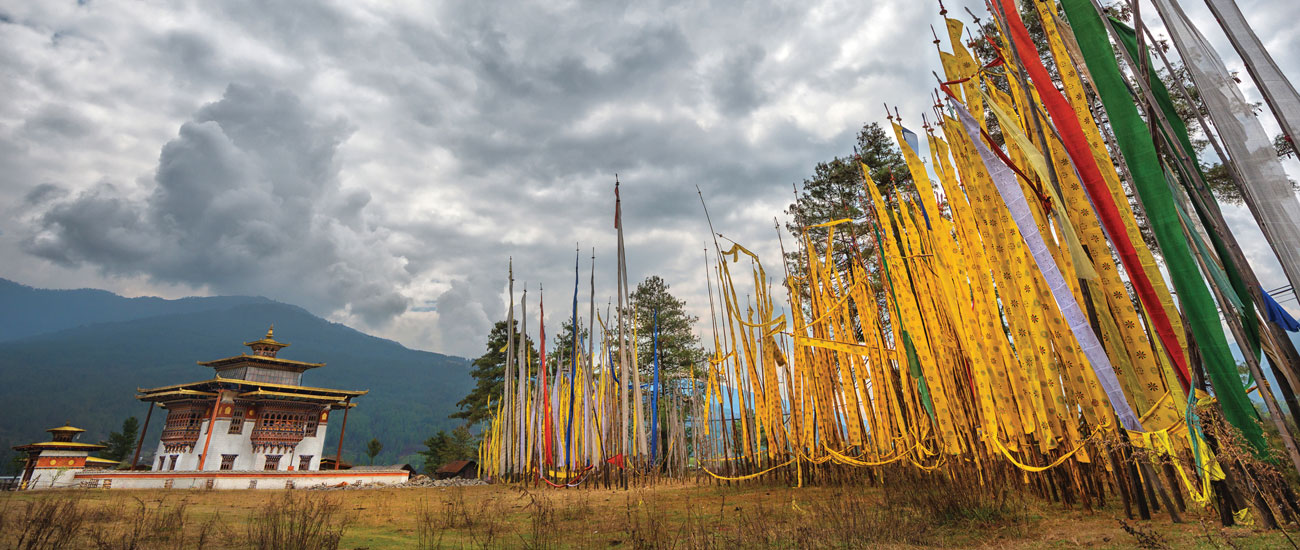
Bhutan’s tourism sector is regarded as one of the most exclusive travel destinations in the world. Bhutan enjoys a reputation for authenticity, remoteness and a well-protected cultural heritage and natural environment.
Today tourism is a vibrant business with a high potential for growth and further development. The Royal Government of Bhutan adheres strongly to a policy of ‘High Value, Low Volume’ tourism which serves the purpose of creating an image of exclusivity and high- yield for Bhutan.
The Vision The tourism industry in Bhutan is founded on the principle of sustainability, meaning that tourism must be environmentally and ecologically friendly, socially and culturally acceptable and economically viable. The Royal Government of Bhutan recognizes that tourism is a world-wide phenomenon and an important means of achieving socioeconomic development particularly for a developing country like Bhutan. It believes that tourism, in affording the opportunity to travel, can help to promote a deeper understanding among people and to strengthen ties of friendship based on a deeper appreciation and respect for different cultures and lifestyles.
Towards achieving this objective, the Royal Government, has adopted a very cautious approach to growth and development of the tourism industry in Bhutan. Its tremendous potential as a truly indigenous industry and the clear comparative advantages Bhutan enjoys, are compelling reasons to promote Bhutan as a high-end tourist destination in a manner which accords with the tenets of Gross National Happiness.
Tourism Levy A tourist must pay a tourism levy known as the Sustainable Development Fee (SDF). The Sustainable Development Fee enables investment in transformative programs that preserve our culture traditions, protect our heritage and environment, upgrade infrastructure, create opportunities for our younger generations and build resilience.
As of 1 September 2023, the effective SDF is USD $100 per person per night for US Dollar paying tourists. In addition, a fifty percent discount on the SDF is granted on the rates applied to children aged between 6 to 12 years for US Dollar paying children visiting as tourists. The 24 hours SDF waiver for tourists staying in the border towns is also applicable.
Guests from India are levied SDF of Nu. 1,200 or equivalent amount in INR per person per night, which will remain in effect for two years, following which time it may be reviewed and revised in keeping with the principle of the preferential rate after two years.
Visa Fee & Required Documentation A passport copy is required. The passport must be valid for six months from the intended date of departure from the Kingdom.
- Travel insurance valid for the duration of the trip.
- A recent passport size photograph.
- The visa fee is USD 40 per person and it is non-refundable. While the process to issue the visa is usually quick, the visa can take up to five working days to process.
Exemption and Concessionary Levy Subject to any conditions specified in the Rules, the Competent Authority may provide for an exemption or concessionary levy rate on the applicable Sustainable Development Fee:
- Day tourists who do not travel beyond the first designated point are exempt.
- Children aged 5 and under are exempt.
- Concessionary levy of 50% for children aged 6 to 12 years.
- Other exemptions or levy rates that may be deemed necessary.
Bhutan Travel Bureau is a licensed tour operator as certified by the Tourism Council of Bhutan , and the Association of Bhutanese Tourism Operators .
Mrs.Carolina Mendes and Mr. Luis enjoying bushman hike in beautiful bumthang valley amongst fresh blooms of Rhododendrons. ... See More See Less
3 weeks ago ·
Share on Facebook Share on Twitter Share on Linked In Share by Email
Our Russian guests on cultural tour in Bhutan 🇧🇹 Wishing our guests wonderful stay in country. Thank you for choosing our company . ... See More See Less
Our guests weekend hike to Taksang , most iconic “Tigers Nest “ . Around this time of year the trail towards Tigers Nest are surrounded by all Rhododendrons hence the best time and season to travel to Bhutan. ... See More See Less
4 weeks ago ·
Picnic Luncheon by the riverside overlooking stunning Punakha Fortress . Wishing our guests wonderful stay in Bhutan ... See More See Less
1st Flr, BTB Building, Behind NGN, Olakha (2.53 mi) Thimphu, Bhutan 11001.
Contact No: 2 332 105 / +975 17 11 42 22
Email: [email protected]
Web: www.bhutantravelbureau.com

23 essential things to know before visiting Bhutan

Feb 2, 2024 • 15 min read
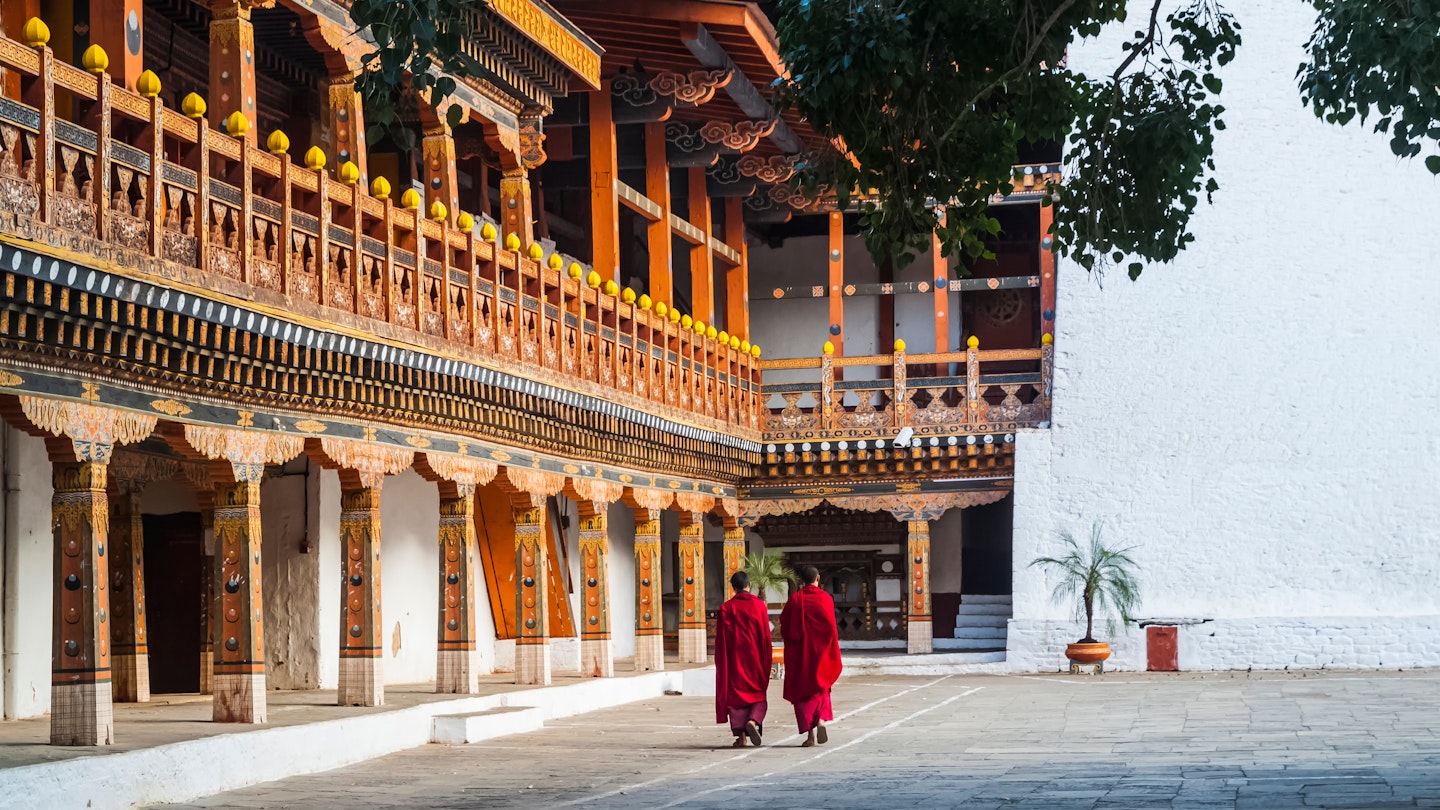
You'll want to observe proper etiquette at Bhutan's Buddhist sites, such as Punakha Dzong © Kateryna Mashkevych / Shutterstock
Perched in the Himalayas between India and China, tiny Bhutan , with cliff-hanging monasteries, golden-roof temples and colorful prayer flags strung along trails and peaks, stands as the last Buddhist kingdom on earth.
Its careful tourism policy has allowed it to slowly open to the outside world without compromising its culture and traditions or degrading its pristine natural environment – two pillars of Gross National Happiness (GNH), a unique philosophy that guides the government of Bhutan.
Having traveled extensively in Bhutan on assignment, I’ve come to embrace its diverse seasons and activities, from horse trekking in Bumthang to rafting down the purple-jacaranda-lined Punakha River to learning how to make hoentey (a specialty buckwheat dumpling eaten during Lomba, the New Year) in the semi-remote Haa Valley.
This quick guide navigates Bhutan's cultural landscape, highlighting its local customs and quirks, as you plan your journey to the country known locally as Druk Yul, the Land of the Thunder Dragon.
1. Independent travel is finally possible, but a tour operator is still the way to go
Since reopening in 2022, Bhutan has scrapped its all-inclusive tour-package minimum, and initially raised the Sustainable Daily Fee (SDF) to US$200 before reducing it to US$100 , valid now through September 2027. There is a 50% discount for kids ages six to 11, with no SDF for those under six. A one-time US$40 visa-application fee also applies.
Fees are significantly lower for travelers from India, who can visit with a special permit. Indian travelers need to have a passport or voter ID card. Indian Aadhar cards are not accepted. Meanwhile, Bangladeshi and Maldivian nationals are eligible for visa upon arrival , but must pay the SDF.
The good news is that adventurous travelers planning a trip can now independently book accommodations, guides (mandatory for any journey beyond Thimphu and Paro) and transportation. You can also, for the first time ever, extend your visa while you’re there, and you can even drive your own car – for a fee.
However, for activities like trekking, attending festivals or engaging in more specialized interests, such as birding, horse trekking or cycling, using a tour operator will undoubtedly enhance your overall experience – and is generally required. Lists of certified tour operators, guides and accommodations, including hotels and homestays, can be found on the official Bhutan Travel website .
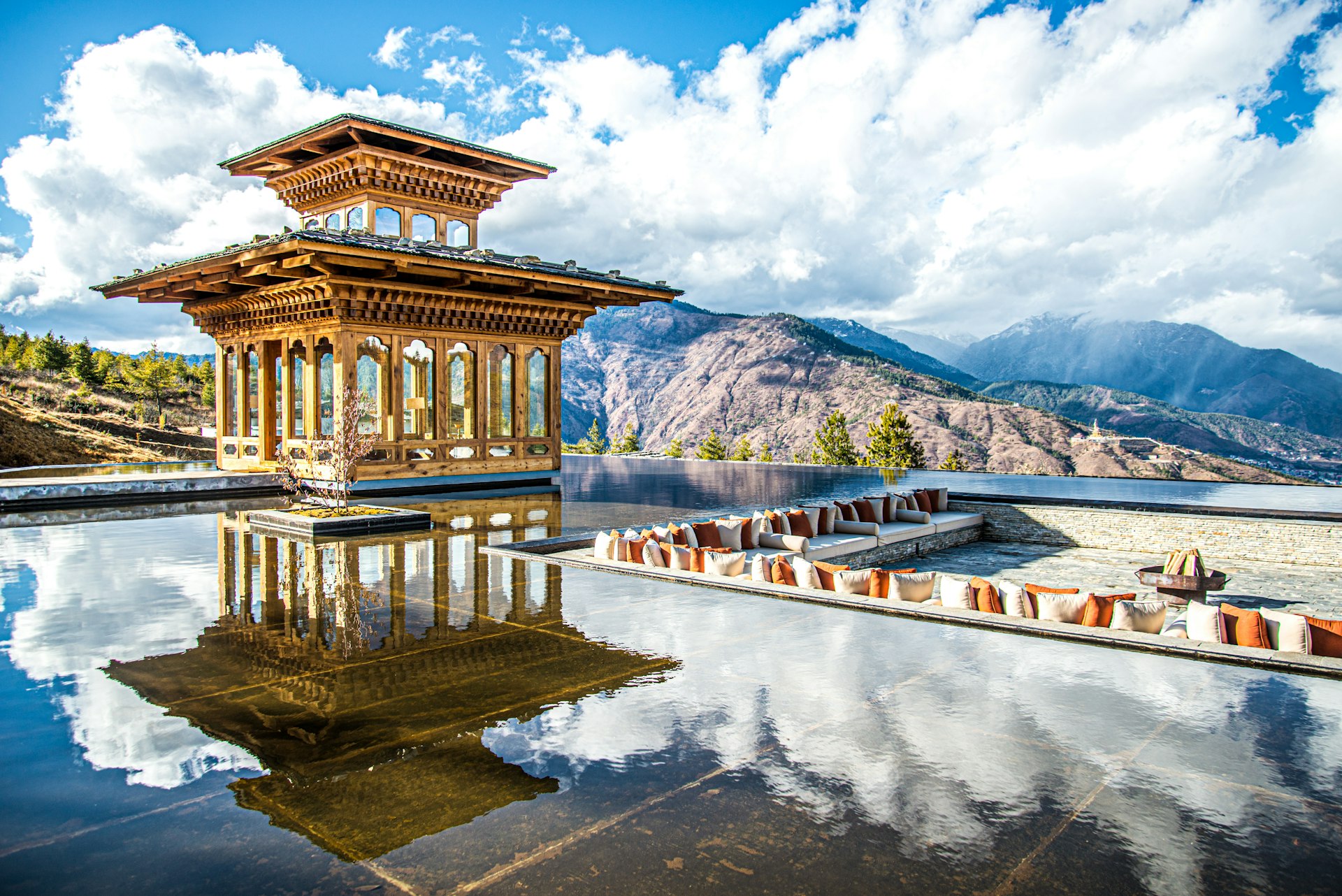
2. Book early for festivals and trekking in the high season
Since reopening, there are no longer incentives for offseason travel, except for occasional hotel deals. This means you may as well time your trip with autumn and spring, when the most famous tsechus (monastic festivals) take place and the leaves change or rhododendrons bloom, respectively. Book far ahead if you’re considering attending a celebration or going trekking.
That said, locals argue that anytime of year is wonderful to visit Bhutan – and that summer and winter are just as wonderful, with plenty of lesser-known festivals. But these seasons are not ideal if you’re planning a multiday trek, due to muddy trails and chilly camping.
Still, the winter holiday season is auspicious, offering crisp air, clear skies and perfect light for photography, with few travelers. Plus, if you go for the December 17 National Day celebrations at Changlimithang Stadium in Thimphu , you may even get the chance to meet the king!
3. Travel insurance is mandatory
Per Bhutan’s Tourism Rules and Regulations 2022 , you must have travel insurance that covers accidental death, permanent disability due to accidents, emergency medical evacuation and hospital charges in case of sickness. You’ll need your proof of insurance coverage – in English – in order to apply for your visa.
If you do find yourself feeling unwell during your trip, consider a visit to Thimphu’s National Institute of Traditional Medicine . A doctor will assess your pulse, temperature and ask about your bowels. In turn, you’ll receive a prescription for ayurvedic medicine crafted from local plants, all at no cost. (A small donation is appreciated.) Another moniker for Bhutan is “Menjong,” which aptly means “Land of Medicinal Herbs.”
Alternatively, head to the nearest hospital or health clinic for treatment geared towards Western medicine. The Jigme Dorji Wangchuck National Referral Hospital , also known as the National Referral Hospital, is the biggest in Bhutan and located in Thimphu.
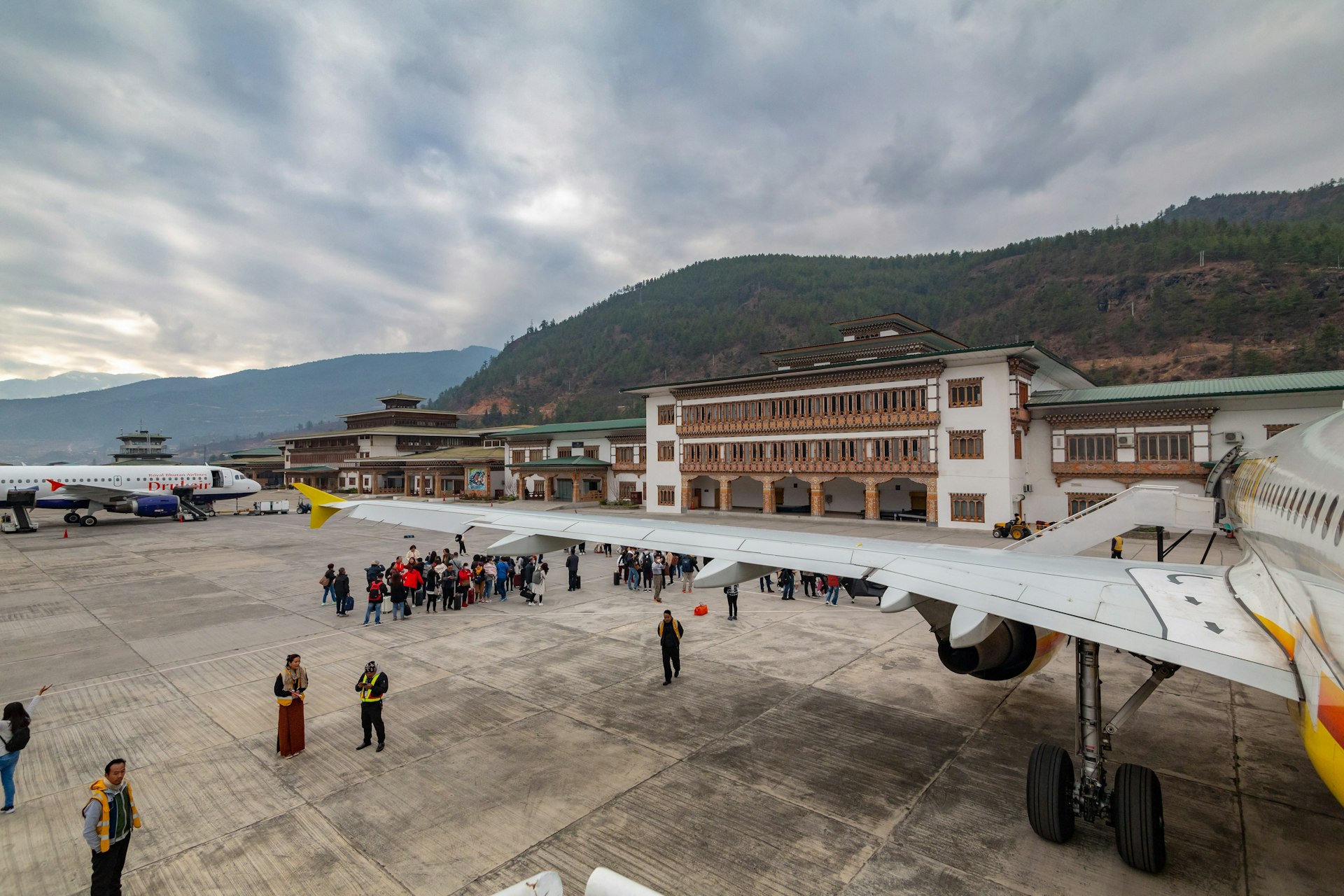
4. Only two airlines fly to Bhutan
Bhutan is served by two national airlines: Drukair and Bhutan Airlines . Because of the challenging landing conditions at Paro International Airport, surrounded by peaks as high as 5500m (18,000ft), only a select few pilots are authorized to fly there.
Direct flights to and from Paro connect you to various destinations, including Bangladesh (Dhaka), India (Bagdogra, Guwahati, Kolkata and New Delhi), Nepal (Kathmandu), Singapore, Thailand (Bangkok) and, from March 2024, the UAE (Sharjah). While Bangkok and Delhi are common entry points, Kathmandu promises the most epic route, with glimpses of Mt Everest on clear days. Request a window seat on the left-hand side when flying to Bhutan.
Note that it’s not possible to check your luggage through to your final destination, so you’ll have to claim it before boarding your Bhutan connection.
You can also reach Bhutan overland via India. (Bhutan has border disputes with China. Transit is not possible.)
5. Bhutan is the world’s first carbon-negative country
Bhutan gained global attention for being the world's first carbon-negative country. Aside from its relatively underpopulated and underdeveloped status (being roughly the same size as Switzerland with only 10% of its population), a key factor in sustaining this achievement is a landmark constitutional mandate requiring the country to maintain a minimum of 60% forest coverage at all times. This is further supported by the environmental conservation pillar of GNH.
Plastic has also been banned since 1999, though it's not regularly enforced. Nevertheless, do your part to keep the environment clean. There’s plenty of signage to remind you along the way: “Clean & beautiful environment is a feast to the soul,” says one placard en route to the Tiger’s Nest Monastery .
6. Bhutan is exceptionally safe
Bhutan, a happy and devout Buddhist nation, maintains a low crime rate, with violent crime being scarce. One of the safest countries you’ll ever visit, it’s ranked the 25th-least-corrupt nation out of 180 countries by Transparency International.
As a single woman, I never felt unsafe on any of my trips to Bhutan. I was also never truly “alone” since I was always under the watchful eye of my guide or local friends. In recent years, the number of female guides has increased, which is more good news for solo women travelers .
7. Save the hike up to Tiger's Nest for the end
Acute Mountain Sickness (AMS) can occur when travelers are above 2500m (8202ft). Given that the most commonly visited cities Thimphu and Paro are just 200m to 300m below that threshold, and that several treks in the Bhutanese Himalayas traverse mountain passes reaching heights of 5000m, AMS is a risk in Bhutan.
Ascend slowly, take rest days when needed, and if you begin to feel ill, stop. If it's not managed carefully, AMS can develop into life-threatening forms of altitude sickness, so pay close attention to how you're feeling. If your symptoms don’t ease, descend right away. Helicopter rescue is always an option in case of emergency.
Note: Due to the altitude, acclimatization may be necessary. I recommend waiting a few days or until the end of your trip – saving the best for last! – before embarking on the iconic Tiger’s Nest Monastery trek , which ascends about 1000m (3000ft). Make sure to schedule a traditional hot-stone bath afterward as well.
8. Stay current on your vaccinations
No vaccines are required for entry into Bhutan. This includes the COVID-19 jab, although you may need proof of it if you’re traveling via India.
That said, you should stay up-to-date with your vaccines and consult a healthcare professional at least eight weeks before your departure in case you need any boosters. Standard recommendations include vaccinations for hepatitis A and B, diphtheria, tetanus, and typhoid, in addition to childhood vaccinations for measles-mumps-rubella and polio.
For longer trips, including travelers who are moving to Bhutan, you may wish to consider vaccinations for Japanese encephalitis and rabies. Rabies is particularly noteworthy since friendly animals, like monkeys and dogs, can all transmit the virus, and untreated infection is fatal. If you are bitten by an animal, such as a stray dog, immediately go to the nearest health clinic and get a postexposure prophylaxis shot (you’ll need a total of four).
9. Pack a few medical essentials
Be wary of mosquito-borne illnesses when visiting in the summer months and in the southern regions. Because of climate change, Bhutan had its first nation-wide dengue epidemic in 2019. Dengue is deadly, and there is no vaccine to protect against it. (Malaria, which can be prevented with drugs, is rare and – fingers crossed – anticipated to be eliminated by 2025 .)
You’ll need sunscreen too. Bhutan's average elevation is 3280m (10,760ft), making it one of the highest countries in the world. It also shares the same latitude as Texas, Egypt and the Bahamas, so the sun is strong. Protect your skin – and your eyes.
There are no tunnels in Bhutan, which means the mountain roads are windy. You may want to consider bringing Dramamine for car sickness and Diamox for altitude sickness – consult your healthcare provider before you travel to discuss whether they're right for you. Pack your own diapers and tampons, if you use them; you can, however, find menstrual pads in stores and at select hotels and restaurants. And don’t forget earplugs – at night, howling dogs can be disruptive to sleep, especially in downtown Thimphu.

10. Bhutanese food is surprisingly delicious – and spicy!
For decades, Bhutanese cuisine suffered in reputation because travelers were mostly exposed to mediocre buffets at their three-star hotels, featuring Indian, Chinese and continental dishes tailored precisely to their palates.
Thankfully, those buffets are slowly being phased out. The local cuisine, emphasizing fresh and seasonal ingredients, is on the up and up and proving to be extremely tasty, if you know where to go. Ask your tour operator or guide for recommendations.
And while Bhutanese cuisine is defined by hot chili peppers, such as with ema datse (chilies with cheese) and kewa datse (potatoes, chilies and cheese), dishes can be modified according to your taste if requested in advance. Still, you may need antacids.
11. Don’t drink the tap water
Tap water isn’t safe to drink in Bhutan unless it has been boiled or purified. Ask your hotel or guesthouse for boiled water, or purchase bottled water to have on your person.
Do, however, drink the local whiskey and lager (Bhutan has a flourishing craft-beer scene).
12. Learn local etiquette
“ Kuzu zangpo la ” means “hello” in Dzongkha, a Sino-Tibetan language and the national language of Bhutan, most commonly spoken in the western part of the country. Recite this while bowing (shaking hands is less common). The deeper the bow, the greater the respect.
Aside from Dzongkha (and the many other local languages and dialects), English is widely spoken because it is the language of instruction in schools. When Bhutanese converse in English, it is common to hear the word “la” at the end of a sentence or question as a sign of respect; for example, “Thank you, la.” Feel free to reciprocate.
If you find yourself invited into someone’s home and offered food, tradition dictates that you say the words “ meshu meshu” while covering your mouth with your hands. After two or three offers, it is customary to accept. Similarly, if you are the one making an offer, or even giving a gift or tip, expect similar resistance. (Do consider giving a small tip if someone has invited you into their home and served you food or arra, a local spirit distilled from rice.)
13. Tipping is appreciated (but not mandatory)
Even if you’ve paid in advance for your all-inclusive trip, show appreciation to your guide and driver by tipping them at the end. On a trek, extend this gesture to the crew – ie the cook, any helpers and the horsemen. While 10–15% is normal, the amount and currency are up to you.
Tipping is not necessary at restaurants and hotels. A 10% service charge is already added to your bill when you dine out.
14. Bhutan has nightlife
While most people are drawn to Bhutan for its serene landscapes, peaceful Buddhist monasteries and imposing fortresses ( dzongs ) such as Punakha Dzong , the country is hiding a buzzing nightlife and music scene that is equally worth exploring.
Thimphu's nightlife centers around Chang Lam near the stadium, featuring diverse options like the Zone (a popular bar hangout), Mojo Park (a fantastic music venue, where the band Misty Terrace got its start), the Grey Area (Bhutan’s first gastropub) and nightclubs Space 34 and Viva City, which are open to the wee hours.
Note: Bhutan has ended dry Tuesdays and bars ars are now open throughout the week.
15. It is finally legal to smoke in Bhutan, but be discreet
Bhutan was long known for its drastic yet visionary health law that forbade smoking and the trade of tobacco products. While the law was recently reversed, smoking must be done “out of sight,” ie behind buildings. The same goes for vaping.
Despite cannabis growing prolifically throughout the country, it remains illegal. Possession can land you in jail for up to one year. The only “drugs” produced in the country are traditional medicines.
Note: While vaping products are sold in a few places in Thimphu, they’re not widely available. It’s advisable to bring your own.
16. Keep an open mind
Whether it’s migoi (yeti) sightings in Bhutan’s wild east, the significance of phalluses as symbols of protection or the flying tiger bringing Guru Rinpoche to the cave where the gravity-defying Tiger’s Nest Monastery now stands, folktales, myths and legends are an integral part of Bhutan’s culture and national pride – and believed to be true.
Approach Bhutan with an open mind. Westerners may find it challenging to suspend logic and reason, but be kind when pushing back, and consider setting aside your own preconceptions. Do as the new tourism tagline says: Believe.
17. Pack layers
You’ll want layers for fluctuating temperatures and varying terrains, and modest clothing for entering temples and monasteries, including socks for cold temple floors. Aside from a good pair of hiking boots, bring a nicer shoe to wear with a gho or kira (Bhutanese national dress for men and women, respectively), should you decide to buy an outfit – highly recommended if you’re attending a festival or meeting with a dignitary. For inspiration, follow Bhutan Street Fashion on Instagram or Facebook.
18. Carry small change
Cash is necessary for buying souvenirs, leaving small donations at monasteries, nunneries and temples (particularly if you’d like a blessing from a monk), and giving tips to your guide, driver and trekking crew, as mentioned earlier.
If you’re an independent traveler, you’ll want to have small bills on hand to pay for entrance fees to sites and museums. Few – as in almost zero – businesses accept credit cards.
19. Stay connected
SIM cards used to be challenging to obtain, but now you can easily get them upon arrival at Paro International Airport. You can also rent a pocket Wi-Fi device there – useful if you’re planning to visit remote regions and need to be online.
20. Bring cash and download these apps
It’s easier to bring your own money (make sure the bills are crisp) rather than rely on and seek out ATM machines in the country. The official currency in Bhutan is the ngultrum, which is pegged 1:1 to the Indian rupee. Do exchange at a bank or hotel so that you can have some small ngultrum notes for butter-lamp offerings and such.
Most Bhutanese businesses accept cash or payments through either goBoB or the BNB MyPay app . Foreign visitors can activate the app by downloading it from Google Play or Apple's App Store, inserting a local SIM purchased at the airport and funding the digital wallet with their credit or debit card. While goBoB is more popular among locals, some tour operators argue MyPay is better for foreigners because it is linked to more international card networks and is powered by Stripe.
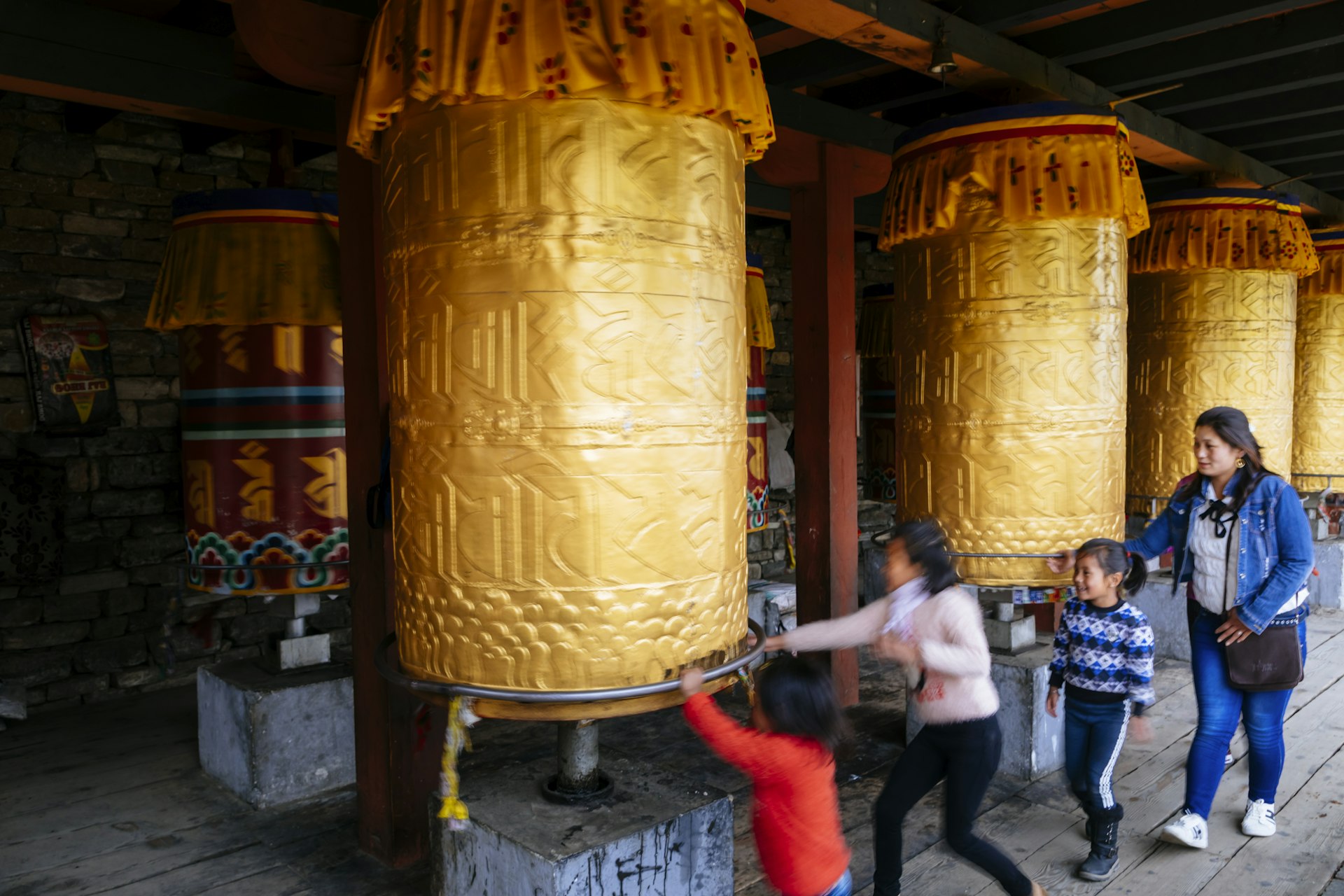
21. Spin prayer wheels clockwise, and other temple tips
When visiting Buddhist monasteries, nunneries and temples, observe proper etiquette: remove shoes and hats, wear clothing that covers your shoulders and knees, refrain from photography in altar rooms, avoid pointing, never lean against a stupa and consider leaving a small donation on the altar or with a monk. If seeking a blessing, it's customary to offer a small donation.
Be it in a car or on foot, circumambulation of a Buddhist temple or shrine, such as a stupa or chorten, must always be clockwise. To go counterclockwise, whether it’s out of ignorance or on purpose, is seen as offensive, culturally insensitive and unlucky. Similarly, prayer wheels, which help purify karma, should be spun in a clockwise direction.
22. Don’t bargain hard
Unlike some other places in Asia, like India or Vietnam, where you’re expected to haggle, Bhutan’s market scene is a lot more straightforward. You typically pay the price that’s listed – aggressive negotiating tactics are a foreign concept.
That said, be prepared to spend a pretty penny if you plan to shop. Your eyes will be undoubtedly drawn to abundantly colorful textiles crafted from natural fibers, like silk and cotton. These can take months to assemble, and the prices – which can top four figures – reflect the meticulous work and cultural richness woven into each piece, often done by women.
Note: Geometric yathras , textiles made of yak wool and commonly found in central Bhutan’s Bumthang region, are more budget-friendly.)
23. Consult the lunar calendar
The Bhutanese calendar is based on Tibet's, which follows the lunar calendar. Buddhist festivals, like tsechus, follow the lunar calendar, meaning the dates change from year to year. There are other cultural festivals, like Bhutan National Day and the Black Necked Crane Festival in Phobjikha Valley, that follow the Gregorian calendar and therefore stay the same.
Explore related stories
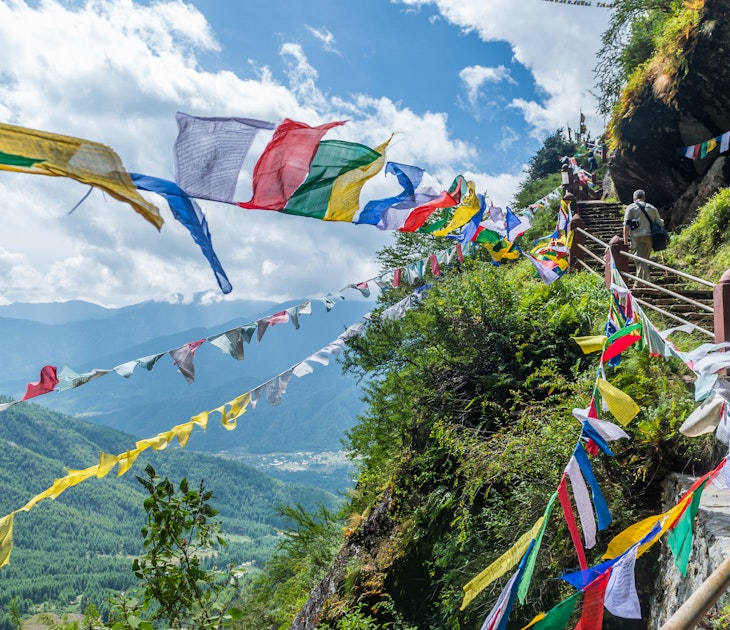
Budget Travel
Jan 28, 2024 • 7 min read
These top tips along with a guide to daily costs can help you plan your budget for a visit to Bhutan.

Jan 17, 2024 • 6 min read

Jan 17, 2024 • 8 min read
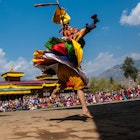
Jan 16, 2024 • 5 min read

Jan 2, 2024 • 8 min read

Dec 20, 2023 • 7 min read

Oct 15, 2023 • 3 min read
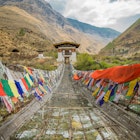
Aug 31, 2023 • 11 min read
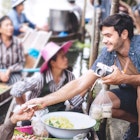
Feb 22, 2023 • 4 min read

Sep 26, 2022 • 10 min read
- Culture & Lifestyle

- Madhesh Province
- Lumbini Province
- Bagmati Province
- National Security
- Koshi Province
- Gandaki Province
- Karnali Province
- Sudurpaschim Province
- International Sports
- Brunch with the Post
- Life & Style
- Entertainment
- Investigations
- Climate & Environment
- Science & Technology
- Visual Stories
- Crosswords & Sudoku
- Corrections
- Letters to the Editor
- Today's ePaper
Without Fear or Favour UNWIND IN STYLE

What's News :
- Financial embezzlement
- Extension of Sirohiya's remand
- Hospital construction in Achham
- Budget battle
- CAN& Lamichhane's visa
Tourism Ministry gets almost Rs12 billion budget

Post Report
The government has allocated almost Rs12 billion for the tourism sector.
Unveiling the budget for fiscal 2024-25, Finance Minister Barsha Man Pun said that a budget of Rs11.91 billion has been earmarked for the Ministry of Culture, Tourism and Civil Aviation.
Pun also said that the government aims to welcome 1.6 million tourists in the upcoming fiscal year.
The finance minister also announced plans to facilitate foreign tourists who come to Nepal for wedding ceremonies in a bid to promote various cultural and tourist destinations within the country as wedding destinations.
The government will also lease government lands to the private sector for hotel construction to increase the number of tourists.
Roadways, electricity and water facilities will be provided to such buildings via cooperation between the local and provincial governments, Pun added.
A budget of Rs5.46 billion has also been allocated to improve tourism infrastructure, such as repairing roadways and establishing tourist rescue centres in potential risk-prone areas, among others. The amount will be spent through the Tourism Department.
Related News

Five priorities of the new budget

Rs567 billion allocated to provincial and local governments

Government unveils Rs1.86 trillion budget for fiscal 2024-25

Government reduces budget for Ministry of Industry, Commerce and Supplies to Rs9.28 billion

Government announces establishing consumer court

Most Read from Money

Nepal bans widely used Indian spice brands Everest and MDH

Nepal’s court summons foreigners and firms implicated in 2017 Airbus deal

Nepal’s economy is on shaky ground. The budget battle begins

Nepal’s agriculture, water resources under climate threat

Editor's Picks

Nepalis losing millions in illicit pursuit of ‘American dream’

Speakers are supposed to be neutral. Not all succeed in the role

Recessionary fallout on banking

7 years on, Nepal and China still at odds over BRI execution

Is judicial supremacy trumping constitutional supremacy in Nepal?
E-paper | may 29, 2024.
- Read ePaper Online

COMMENTS
Bhutan's tourism policy for 2023 has something special for families. Children aged between 6 to 12 years, visiting as tourists, will also enjoy a fifty percent discount on the SDF (i.e. USD 50). This thoughtful provision encourages families to explore Bhutan together, creating lasting memories while nurturing an appreciation for Bhutan's ...
The Tourism Council of Bhutan is pleased to announce the Tourism Policy of the Kingdom of Bhutan 2021. The policy envisions to promote Bhutan as a green, sustainable, inclusive, and a high-value tourism destination guided by the policy of 'High-value, Low volume' tourism to contribute to the overall socioeconomic development of the country.
quality infrastructure, tourism products and services, experiential tourism and Brand Bhutan. 5 Objective The overall objective of the National Tourism Policy is to Promote High value, Low volume tourism to foster sustainable, competitive and inclusive growth to enhance the industry's contribution to nation building. 6 Policy Statements
The new policy, officials say, will rebrand Bhutan as "an exclusive destination," attracting "discerning tourists" who will have access to a wider range of higher-quality services ...
Bhutan, a tiny Himalayan kingdom known for its pristine environment and sustainable development, will cap tourist numbers at 200,000 a year from 2023 to protect its natural resources and fight climate change. The move is part of the country's efforts to become carbon neutral by 2025. Bhutan is already 72% carbon negative, meaning it absorbs ...
More than once, Bhutan has tried opening to more tourists and making tourism a robust economic pillar, but it soon switches to a protective mood, fearing adverse impacts on its environment. In ...
The new policy has stirred up some curiosity and displeasure outside of Bhutan. To get a better understanding of the motivations behind the move, Daily Bhutan reached out to the Director General of Tourism Council Bhutan (TCB), Dorji Dhradhul for a chat. The conversation was enlightening.
The Kingdom of Bhutan officially reopens to international travelers since the onset of the COVID-19 pandemic today, September 22, unveiling a new tourism strategy focusing on sustainable development, infrastructure upgrades and more. Bhutan will raise its Sustainable Development Fee (SDF) from USD$65 to USD$200 per person, per night.
New Tourism Policy of Bhutan 2022. The revamp of Bhutan's tourism comes amid a widespread 'transformation project' rolled out across the country, from the civil service to the financial sector. The changes are geared toward developing Bhutan's human capital by equipping the population with more proficient skills, knowledge, and ...
The Kingdom of Bhutan reopens its borders today to international travellers following the Covid-19 pandemic. Aside from welcoming visitors to the country, Bhutan has also unveiled a new tourism strategy, underpinned by transformations in three key areas: infrastructure and services, tourists' travel experiences, and environmental impact to maintain carbon-neutral tourism.
On 27th June 2022, the bill was passed to levy the revised Bhutan SDF for International guests from USD 65 to USD 200. You can read the article here. In the light of the introduction of Bhutan New Tourism policy to Levy the SDF to 200 and introduction of entry fees to monuments, many questions are afloat. We are here to answer your question.
The Tourism Council of Bhutan (DOT) is pleased to announce the Tourism Policy of the Kingdom of Bhutan 2021. The policy envisions promoting Bhutan as a green, sustainable, inclusive, and high-value tourism destination guided by the policy of 'High-value, Low volume' tourism to contribute to the overall socioeconomic development of the country.
A tourist shall engage a guide with relevant specialization based on the nature of the tour and shall be open to choose and change tour guide as provided in these Rules and Regulations. 25. A minimum of one guide shall be arranged for every ten tourists in a group or. 15 tourists if accompanied by a tour leader. 26.
Bhutan Tourist Tariff New SDF informationAfter two years of tourism at a standstill due to the pandemic, our country finally opened its gate on 23rd September 2022. With the onset of the new tourism wave worldwide, our country is set on a different path.On 27th June 2022, the National Assembly ... Low Volume" policy which was adopted when ...
The new tourism policy also states that if a tourist visits Bhutan during the day and plans to halt for the night within its border towns or beyond a designated point has to pay the SDF. Another, significant change made as per the new Tourism Rules and Regulations is that a visitor has to book his/her accommodation in a hotel with no less than ...
Bhutan Tourism Monitor 2020 7 FOREWORD The Tourism Council of Bhutan is pleased to present the annual statistical publication 'Bhutan Tourism Monitor 2020'. This publication presents the overall performance of tourism for the year including data on market trends, findings and analysis to support future development of the tourism industry.
Welcome to Bhutan. In a world that is always on the go, Bhutan provides sanctuary. Here, you can find earthly pleasures: archery and age-old crafts, dishes of home-made cheese and fearsomely hot chillies, breathtaking treks and restorative hot-stone baths. But there's another Bhutan, too - the one hinted at by the prayer flags strung across ...
New tourism policy of Bhutan came into effect from 20th June, 2022. All nationals visiting Bhutan must pay USD 200 per person per day.
Furthermore, he stated that the government provides the Tourism Council of Bhutan full support to help the country's tourism sector grow abroad. The new policy will replace the USD 65 for the SDF with USD 200. In addition to SDF, there will be growth in other tourism-related industries in the coming days.
This Tourism Policy of the Kingdom of Bhutan sets the agenda and direction for the development of tourism sector. The overall objective of this National Tourism Policy is to promote high value, low volume tourism to foster sustainable, competitive and inclusive growth to enhance the industry s contribution to nation building. ...
Last September, Bhutan introduced a 50% reduction in the SDF rate, effective until August 31, 2027, with incentives for children. The new rates are USD 100 per adult per night; while children between the ages of 6 and who have not yet turned 12 pay a reduced rate of USD 50 per night.
The Royal Government of Bhutan adheres strongly to a policy of 'High Value, Low Volume' tourism which serves the purpose of creating an image of exclusivity and high- yield for Bhutan. The Vision. The tourism industry in Bhutan is founded on the principle of sustainability, meaning that tourism must be environmentally and ecologically ...
Perched in the Himalayas between India and China, tiny Bhutan, with cliff-hanging monasteries, golden-roof temples and colorful prayer flags strung along trails and peaks, stands as the last Buddhist kingdom on earth.. Its careful tourism policy has allowed it to slowly open to the outside world without compromising its culture and traditions or degrading its pristine natural environment ...
The government has allocated almost Rs12 billion for the tourism sector. Unveiling the budget for fiscal 2024-25, Finance Minister Barsha Man Pun said that a budget of Rs11.91 billion has been earmarked for the Ministry of Culture, Tourism and Civil Aviation. Pun also said that the government aims ...